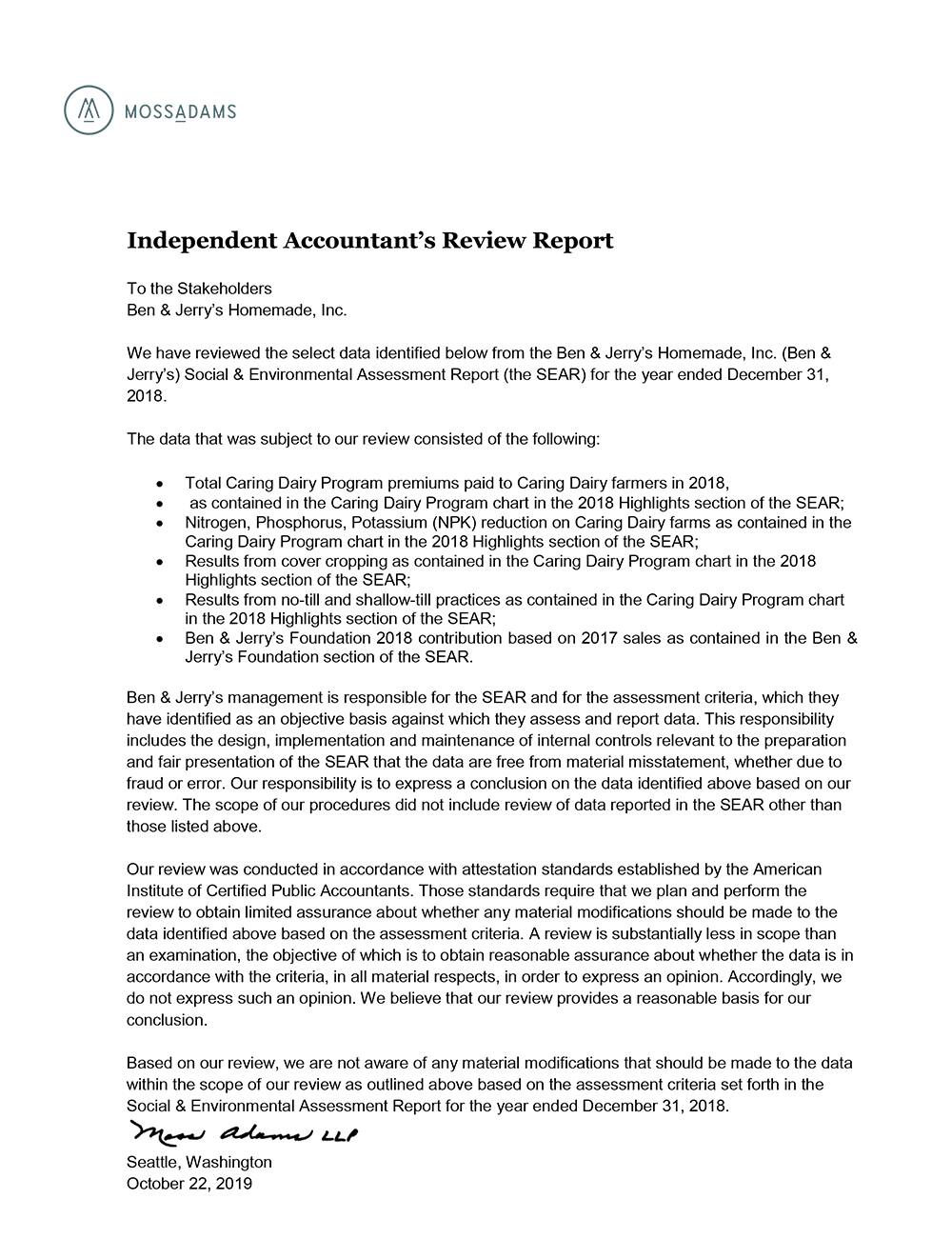2018 Social & Environmental
A LETTER FROM OUR CEO
 2018 was my first year on the job as Ben & Jerry’s CEO. It’s quite a privilege to take over the helm of this pioneering business. Our company was created over 40 years ago in a small ice cream shop in a renovated gas station on a street-corner in Burlington, Vermont. From the early days, Ben and Jerry, two very real and innovative guys, believed their company could do more than simply churn out delicious ice cream and spin-off profit. They built this company to be an extension of their own progressive values and they pioneered a new approach to business they called values-led business organized under a linked prosperity model. That business model is built upon a foundation of integrating societal concerns and the advancement of progressive social change as a function of the day-to-day business decisions we make. In creating this model, they changed forever the business world. I believe that our values-led business model is the definition of what it means to be a thriving, sustainable business.
2018 was my first year on the job as Ben & Jerry’s CEO. It’s quite a privilege to take over the helm of this pioneering business. Our company was created over 40 years ago in a small ice cream shop in a renovated gas station on a street-corner in Burlington, Vermont. From the early days, Ben and Jerry, two very real and innovative guys, believed their company could do more than simply churn out delicious ice cream and spin-off profit. They built this company to be an extension of their own progressive values and they pioneered a new approach to business they called values-led business organized under a linked prosperity model. That business model is built upon a foundation of integrating societal concerns and the advancement of progressive social change as a function of the day-to-day business decisions we make. In creating this model, they changed forever the business world. I believe that our values-led business model is the definition of what it means to be a thriving, sustainable business.
Two powerful emotions I felt after joining the business in July of 2018 were excitement and gratitude. I could not be more excited to join the amazing team at Ben & Jerry's. Our people are at the very heart of how Ben & Jerry's has become one of the most loved and trusted businesses in all 38 countries where we operate. Their passion for serving our fans, growing the business and increasing our positive impact around the world is truly inspiring. I also feel deep gratitude in joining Ben & Jerry’s at this special moment for the business. It is an honor to be part of this team and to have both the opportunity and responsibility to grow our unique business model. The world is facing increasingly urgent challenges on many fronts – we at Ben & Jerry’s must raise our ambitions, double our efforts and amplify our positive impact around the world in new ways. Our mission of linked prosperity and driving for progressive social justice is needed now more than ever in all of the communities we serve globally.

One of the more profound moments for me in 2018, which spoke directly to justice in many layers, was the launch of Pecan Resist in Washington, DC, in October. Our Pecan Resist initiative stands for freedom, community, belonging and justice in a world that desperately needs more of these things right now. The campaign kicked off at the National Press Club, with the White House right around the corner. I had the honor of leading the event, welcoming our partners and guests who attended. The artist and activist, Faviana Rodriguez, shared her excitement and appreciation for designing the Pecan Resist pint package and supporting graphics, while pointing out the challenges we were undertaking. We also had representatives speak from each of our 4 partner groups, which were the beneficiaries of the campaign. They were:
- Winona LaDuke, Executive Director, Honor the Earth
- Brandi Collins, Senior Director, Color Of Change
- Dani Marrero Hi, Editor-in-Chief, Neta
- Linda Sarsour, Co-Chair, Women’s March
All 4 organizations are doing tremendous work around social justice, equity and the environment. Our co-founders, Ben and Jerry, closed out the event with words of inspiration concerning how the current political environment is working against the values our business has fought for over four decades. Ben reminded everyone that this is not a partisan effort – but a stance of values. It was an example of how we see our role in the world, to have the courage to stand for our values and convictions – human rights, moral dignity, environmental justice – even when they might be seen as controversial. And without question, our Pecan Resist effort proved controversial with criticism coming from supporters of the president and some who believe that statements from leaders of the Women’s March were anti-Semitic. We took into account all of the feedback and points of view that came to us and gave them deep consideration. In the end, we stood for the principles of the Women’s March, respectfully acknowledging the diverse voices who represent the complexities of the current state of affairs in the US and beyond.
I have tremendous and unwavering optimism for what Ben & Jerry’s is accomplishing today and for the impact we will create tomorrow. I look forward to creating an even greater impact as the world's best ice cream and as a powerful force for social & climate justice.
Please note that this year we are transitioning to a more info-graphic rich version of our annual SEAR. We hope this is more user-friendly and accessible to people. If you’d prefer, there's a longer form report that is dense with details and narrative. Thank you for taking the time to check in on us. Please enjoy this report.
Take care and be well,
Matthew McCarthy
CEO
2018 Highlights
In years past, we’ve published a Highlights section to give the broad strokes of our progress in the past year. This year we wanted to try a little something different. We’ve created infographics to highlight our social mission campaigns, and to encapsulate the gist of our progress and findings in four major areas - Equity, Dairy, Fairtrade and Climate. Each infographic can be opened and closed by clicking on the “+” sign to the right of each title. Further down in the report we will dig deeper into these issues. Enjoy!
Our Social Mission Three Year Plan
The roots of our values-led business model go back to the deep sense of community that we believed in when we opened our doors for the first time on May 5, 1978.  However, we really brought definition to the purpose-driven model in 1988 when we published our precedent-setting three-part Mission Statement that included a Social Mission in equal standing to the Product and Economic Missions. Over the four decades since, we’ve gone through a regular process of setting multi-year plans that help us to strive for targets that challenge us to do more and achieve better outcomes. 2018 was one of those planning years when we needed to refresh our priorities, direction and goals. We set a three-year horizon (2019-2021) for our business and our Social Mission. That said, we totally understand that the world we live in requires a multi-generational vision, well beyond the next three years. We know that we need to endlessly raise the bar on what it means to be a values-led business and the effort it will take to achieve success in all three parts of our Mission.
However, we really brought definition to the purpose-driven model in 1988 when we published our precedent-setting three-part Mission Statement that included a Social Mission in equal standing to the Product and Economic Missions. Over the four decades since, we’ve gone through a regular process of setting multi-year plans that help us to strive for targets that challenge us to do more and achieve better outcomes. 2018 was one of those planning years when we needed to refresh our priorities, direction and goals. We set a three-year horizon (2019-2021) for our business and our Social Mission. That said, we totally understand that the world we live in requires a multi-generational vision, well beyond the next three years. We know that we need to endlessly raise the bar on what it means to be a values-led business and the effort it will take to achieve success in all three parts of our Mission.
DEFINING THE NEXT THREE YEARS
Any future vision, whether it’s looking just over the next ridge line or far beyond the horizon, will need to consider the impact of our work for the next several generations. We know that climate justice and social equity will take generations to solve. Our goal in 2018 was to put a practical timeframe on our near-term work, so we can set a pace of progress that carries us forward in a positive trajectory over a longer stretch of time. In 2018, the Ben & Jerry’s community sharpened its collective pencils to create a plan for our next three years (2019-2021). We started that process by defining What we do, Why we do it and How we do it.
What We Do
Ben & Jerry’s Social Mission strives to advance human rights and dignity, enable social and economic justice for historically marginalized communities, and works to protect and restore the Earth’s natural systems through the way we conduct business and use our influence to achieve systemic change.
Why We Do It
The following interconnected key values underlie the Ben & Jerry’s Social Mission and serve as a foundation for Ben & Jerry’s Social Mission. Our greatest leverage can be found at the linkages between them.
- Human Rights & Dignity We are committed to the rights of all people to live with liberty, security, self-esteem, freedom of expression, protest, and to have the opportunity to provide for their own needs and contribute to society.
- Social & Economic Justice We are committed to achieving equity, opportunity and Justice for communities across the globe that have been historically marginalized, with recognition that this is tied to fair livelihoods that enable individuals, families and communities to thrive.
- Environmental Protection, Restoration & Regeneration We are committed to a positive, life-giving environmental impact that restores degraded natural environments and enables increased diversity and abundance of ecosystems.
How We Do It
We believe that Ben & Jerry’s can fulfill our responsibility to be a radically effective force for good within society in several important ways:
- by reflecting our values in our value chain to ensure that the people and communities that contribute to our business, and the planet upon which it depends, all share equitably in the benefits of our success through our linked prosperity model;
- by leveraging our influence with fans and other businesses, our activism campaigns conducted with a wide range of partners, and other actions that provide leadership to promote systemic progressive social change guided by our values; and,
- by achieving long term equitable growth, value creation and profitability for all stakeholders in our value chain to prove the success of our business model as a viable alternative to business as usual.
To summarize, we strive to create impact and influence through the way we do business. Impact through our values-driven business decisions, influence through our advocacy and activism.
We Are an Activist Company
Ben & Jerry’s is growing as a global company. We are growing the global teams that serve our three-part Mission. In May 2018, we brought together our growing global Social Mission team to Vermont. Our vision for the activism work at Ben & Jerry’s is to leverage our company and its connection with our fans to build strategic activism campaigns that address root causes of issues and advance systemic progressive social change.
We do this because we believe that business has a responsibility and a unique opportunity to be a powerful lever of change in the world. We can bring traditional and contemporary business tools to drive systemic progressive social change by advancing the strategies of the larger movements that deal with those issues, such as climate justice and social equity.
Social Equity
Equity Work Inside Ben & Jerry’s

We have always considered ourselves to be a company that works for justice. And even though we strive to be a company that is diverse, inclusive and equitable, we know we can fall short at times in that ambition. We are addressing issues that are steeped in centuries of systemic and institutionalized evolution and we know it will require an interminable journey to achieve fair, just and equitable outcomes. We have taken intentional steps forward to design a thoughtful, systematic approach to become the company we envision.
To support our social equity platform, the following high-level goals are in front of us:
- Ben & Jerry’s will create an inclusive and fair workplace culture that attracts and retains diverse talent; enables a resilient, high-performing workforce, and; positions the business as an ‘employer of choice’ for high performing professionals.
- Ben & Jerry’s will use its influence and impact as a major economic and cultural engine to advance opportunities, access and inclusion for marginalized and under-resourced populations across the five pillars of social equity – economics, education, social capital, civic participation and cultural pluralism – in its value chain.
- Ben & Jerry’s will use its influence and impact as a buyer and producer to create a sustainable supply chain that promotes a socially diverse, inclusive supplier community, enables economic prosperity, ensures environmental health, and fosters ethical behavior, enabling a high quality of life for all communities affected by our business practices and activities.
Setting Goals
To effectively achieve our vision and engage in a broader cultural and organizational paradigm shift, we have adopted following objectives that we aim to achieve between 2019-2021:
- Develop and adopt a company-wide understanding and frame for Social Equity that informs design and/or evolution of internal programmatic strategy, policies, and practices
- Continue expanding internal knowledge among staff and leadership to move from conceptual understanding of social equity to putting it into practice
- Evaluate existing and create new pathways to increase racial and cultural diversity within the company
- Expand and strengthen strategic partnerships with NGOs, foundations, and other anchor institutions to enhance and broaden the company’s understanding of the issue landscape
- Develop, evaluate, and evolve new ways of engaging our fans around complex intersectional issues that enhances their awareness, understanding, and ability to undertake meaningful interaction with vested stakeholders and communities affected by equity-based issues
- Constructively apply a social equity lens to our existing social mission programs and campaigns that address directly or indirectly, climate justice challenges
During Q4-2018, the company concluded Phase I of our plan: Baseline Setting and Planning which included the completion of the Equity Opportunity Assessment and Final Recommendations Report. Both the assessment and report are designed to help the company achieve its social equity goals of creating an inclusive and fair workplace culture, and advancing opportunities, access and inclusion for marginalized communities throughout its supply chains and value chains
Progress in 2018
We had two broad goals for Phase I in 2018:
- Identify and Activate Leverage Points - Formally assess the company’s business practices and programs to identify short-term and long-term opportunities for change and develop concrete strategies to engage staff and stakeholders in actions to move the company towards its vision.
- Expanded Learning and Application – Build on current learning to support continuous opportunities for the management, staff and Board of Directors to expand their knowledge. Ideally, this will allow the company to seamlessly move from where we are now, early in our journey, to ongoing substantive action.
During Q4-2018, the company concluded Phase I of our plan: Baseline Setting and Planning which included the completion of the Equity Opportunity Assessment and Final Recommendations Report. Both the assessment and report are designed to help the company achieve its social equity goals of creating an inclusive and fair workplace culture, and advancing opportunities, access and inclusion for marginalized communities throughout its supply chains and value chains
Internal Equity Assessment
As outlined in the assessment plans, our NGO partners, Race Forward and Frontline Solutions, completed a full-scale Racial Equity Recommendations Report. The Report consists of 8 recommendation
- Ongoing Skill Development for Staff
- Governance and Leadership
- Internal Infrastructure to Support Racial Equity Efforts
- Partnerships and Collaborations
- Influence and Alignment of Efforts with Unilever’s Diversity and Inclusion Department
- Operationalize Racial Equity across the Company
- Development of a Company-Wide Racial Equity Action Plan
- Regular Documentation, Tracking, and Assessment
For each of the areas identified, there are a 3 to 4 recommended strategies and additional sub-strategies for consideration. The strategies will inform the design and implementation of comprehensive equity plans within Ben & Jerry’s and serve to create a culture that has equity at its center.
Racial Equity Training
In December 2018, the company held a full-day interactive training conducted by Race Forward, as part of the activities proposed during Phase I. More than 100 participants from Ben & Jerry’s Central Offices and Vermont Manufacturing and partners from Seventh Generation and the University of Vermont participated. The training provided staff and partners with an opportunity to meet the following learning objectives:
- Deepen a shared understanding of key concepts central to racial equity
- Examine historical policies that have created and maintained racial inequities
- Strengthen individual and team’s analysis of implicit bias and institutional and structural racism
- Engage in action planning to identify next steps and explore way to apply the knowledge gained to Ben & Jerry’s work moving forward
Overall the training was positively received. A full staff training to build upon and reinforce existing skills and knowledge will be conducted annually with more learning opportunities to be provided in the interim. Additionally, in 2019, a small cohort of consultants and subject matter experts will develop a complementing, culturally relevant training for Ben & Jerry’s European team.
EXTERNAL SOCIAL EQUITY ADVOCACY
United States: Systemic Racism
The Poor Peoples’ Campaign
The Poor People’s Campaign (PPC) is a national movement calling for Americans to unite across race, nationality, and class, to fight poverty, racism, and militarism. It is named after the 1968 Poor People’s Campaign led by Dr. Martin Luther King Jr., until his assassination that year. The goal in 1968 was to get the government to re-prioritize military spending and invest more in addressing issues of poverty. 50 years later, there’s still much work to do. The modern-day Poor People's Campaign seeks to unite Americans across race, nationality & class to fight poverty, racism, militarism & ecological devastation.
Today, using the Supplemental Poverty Measure (SPM), which takes into account income as well as the costs of food, clothing, housing and utilities, and government programs that have assisted low-income families and individuals who are not otherwise designated as poor, 43.5 percent of the U.S. population — or 140 million people — were poor or low-income in 2016. Millions of children and adults continue to live without access to healthcare, housing, clean water, or good jobs.
In 2018, we used our tools and channels to advance the larger strategy of the Poor People’s Campaign, which seeks to organize and empower poor and disenfranchised people in a way that builds lasting and broad-based political power.
Between May 13 and June 23, 2018, the PPC launched a 40-day period of mobilization to highlight the issues of systemic racism, poverty, ecological devastation, and militarism. Ben & Jerry’s worked together to support national events by the PPC and some of its state affiliates during this period, which culminated with events in Washington, DC at the end of the mobilization.
Living History
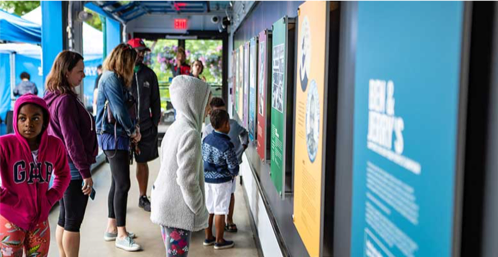 We were so proud and happy to team up with the Smithsonian’s National Museum of African American History and Culture (NMAAHC) in June 2018 to unveil at our Vermont Factory Tour an exhibit telling the story of the 1968 Poor People’s Campaign.
We were so proud and happy to team up with the Smithsonian’s National Museum of African American History and Culture (NMAAHC) in June 2018 to unveil at our Vermont Factory Tour an exhibit telling the story of the 1968 Poor People’s Campaign.
One of the highlights of the opening weekend was getting to meet Dr. Bernard Lafayette, a hero of the Civil Rights Movement, a friend and colleague of Dr. King, and the national coordinator of the 1968 Poor People’s Campaign. We could read about the history of the campaign in the exhibit, and then turn around and listen to a man who helped make that history happen.
He told us that Dr. King wanted to bring the poor of America to Washington, DC, so that lawmakers could see their faces. Politicians were drafting laws based on numbers and statistics, 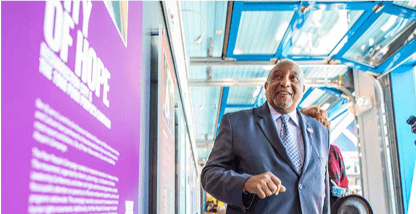 Dr. Lafayette said, but King wanted to “put a face on poverty.” Dr. Lafayette has dedicated his life to keeping Dr. King’s dream alive. It feels like the world has never needed that kind of commitment more than it does right now.
Dr. Lafayette said, but King wanted to “put a face on poverty.” Dr. Lafayette has dedicated his life to keeping Dr. King’s dream alive. It feels like the world has never needed that kind of commitment more than it does right now.
Relative to this work, on the 50th anniversary of Dr. Martin Luther King Jr’s assassination, at the A.C.T. to End Racism Rally in Washington, DC, our co-founders Ben and Jerry shared an interesting perspective on how white privilege helped them to their success in life and what might have happened if they were not born white.
Florida Rights Restoration
November 6, 2018 marked the successful culmination of 18 months of Ben & Jerry’s work alongside leaders and allies in Florida in support of the restoration of voting rights for the 1.4 million citizens convicted of a felony that have fully paid their debt to society. 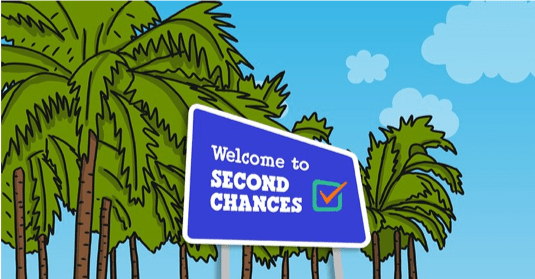 The initiative was a powerful example of how Ben & Jerry’s can add real value to campaigns that drive progressive social change and have meaningful real-world results. We brought a unique set of tools and capabilities to the larger national coalition of groups supporting the initiative, including our broad reach on digital and social channels, media budgets, our Florida-based Ben & Jerry’s franchisee network, and a statewide truck tour. Initiative 4 passed with 64% of the vote, an incredible result in a state where elections often turn on a handful of votes. The result reinforces our belief that there is an emerging bi-partisan consensus supporting reforms within our criminal justice system.
The initiative was a powerful example of how Ben & Jerry’s can add real value to campaigns that drive progressive social change and have meaningful real-world results. We brought a unique set of tools and capabilities to the larger national coalition of groups supporting the initiative, including our broad reach on digital and social channels, media budgets, our Florida-based Ben & Jerry’s franchisee network, and a statewide truck tour. Initiative 4 passed with 64% of the vote, an incredible result in a state where elections often turn on a handful of votes. The result reinforces our belief that there is an emerging bi-partisan consensus supporting reforms within our criminal justice system.
Yes Pecan - Special Edition Flavor & Campaign
As the United States was focused was on the 2018 midterm elections, we were unsettled with the ugly tone of the public discourse, which was angry, bigoted and uncivil. Over the course of our 40 years in business, we’ve sought to advance human rights and dignity, social justice for those who have been historically marginalized as well as environmental protection. We’ve taken action and stood strong on issues such as a livable wage, worker rights, voting rights, refugee rights, marriage equality, to mention some.
But today, much of that progress is at risk from a challenging political environment filled with angry rhetoric. We sit at a precipitous inflection point in modern American history. It is in these moments, when so much is as stake, that it is most important to stand and be counted. We choose not to be complicit in the normalization of fear, bigotry, and hate by remaining silent. In 2018, we chose to stand up and speak out in defense of our deeply held values of dignity and human rights, social and economic justice, and the protection of our environment.
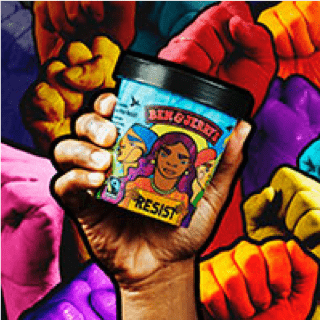 On October 30, 2018 we launched Pecan Resist, one of the most unique and provocative initiatives in the company’s 40-year history. Pecan Resist included a full integrated activation comprised of events, digital content, paid media, and media/influencer outreach, and was timed just ahead of the US mid-term elections. The launch provided a strong platform to promote the things we believe and those fighting to defend the rollback of decades of progress on social, economic, environmental, and civil rights and creating a powerful and positive vision for America’s future. The initiative was a partnership with Favianna Rodriguez (artist/activist), The Women’s March (Women’s & Immigrant Rights), Honor the Earth (Climate Justice), Color of Change (Racial Justice), and Neta (Immigrant Rights).
On October 30, 2018 we launched Pecan Resist, one of the most unique and provocative initiatives in the company’s 40-year history. Pecan Resist included a full integrated activation comprised of events, digital content, paid media, and media/influencer outreach, and was timed just ahead of the US mid-term elections. The launch provided a strong platform to promote the things we believe and those fighting to defend the rollback of decades of progress on social, economic, environmental, and civil rights and creating a powerful and positive vision for America’s future. The initiative was a partnership with Favianna Rodriguez (artist/activist), The Women’s March (Women’s & Immigrant Rights), Honor the Earth (Climate Justice), Color of Change (Racial Justice), and Neta (Immigrant Rights).
To be clear, Pecan Resist was not just about what we are against; it is an affirmation of what we are for. We are pleased to support four groups that work to create a more just and equitable society for all: Women’s March (Women’s & Immigrant Rights), Honor the Earth (Climate Justice), Color of Change (Racial Justice), and Neta (Immigrant Rights). These groups received a $25,000 donation from Ben & Jerry’s, participated in activations, and provided stories related to the flavor. We used this initiative to raise the profile, membership, and funding for these organizations.
We were prepared for the expected negative reactions to this campaign however, we were somewhat surprised at the reaction to the partnership with the Women’s March, specifically two of their co-presidents Linda Sarsour and Tamika Mallory. We have worked with and featured Linda Sarsour in the past with little negative reaction. Her quotes are routinely taken out of context in an effort to drive a narrative that she is anti-Semitic, anti-Israel, and a supporter of radical Islam and terrorism, all of which are untrue. However, with that in mind, we are listening to the diverse voices with differing points of view and paying attention to the many lessons to be learned as we step into deeper layers of complex social issues.
Europe: Refugee Resettlement & Asylum
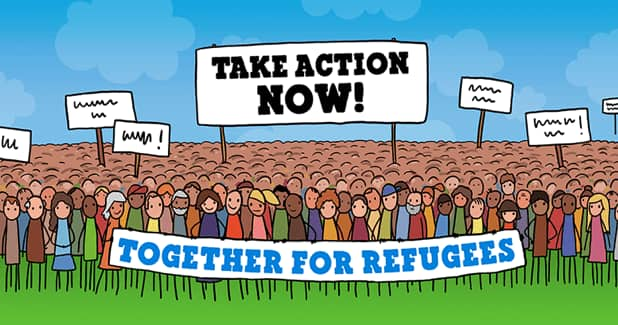 Together with our partner the International Rescue Committee (IRC), we visited cities all over Europe in 2018 to represent the thousands of people who added their name to a petition calling on our leaders to give refugees a safe place to call home.
Together with our partner the International Rescue Committee (IRC), we visited cities all over Europe in 2018 to represent the thousands of people who added their name to a petition calling on our leaders to give refugees a safe place to call home.
Together for Refugees
Leaders in Europe considered a law in 2018 that would bring more vulnerable refugees to the continent in safety. It’s called the Union Resettlement Framework, and it’s our best chance to help people who have been forced to flee their homes due to war and violence to find protection. But sadly there has been some resistance to it becoming law, which is why we took 50,000 signatures, to the decision makers, to demand that they give refugees a safe place to call home.
So where exactly did we take them? The EU has a rotating presidency, and right now it’s Bulgaria who’s in charge. So, we took the 50,000 signatures to Bulgarian embassies all across Europe, as well as to the city where the EU meets most often, the home of moules et frites – Brussels.
People Power
We believe in people power. We believe that when people come together in unity and with a message of hope, justice and kindness, the people in power have no choice but to listen! We’ve already seen that our voices have made a difference in our Together for Refugees campaign – earlier on in the process of creating this law, the thousands of emails people sent helped to push it through some pretty tricky obstacles.
Ice Cream Entrepreneurs (Ice) Academy Expands
We’ve teamed up with our friends at The Entrepreneurial Refugee Network (TERN), a group of pioneering social activists, to see how we could help them in getting people who arrived as refugees back into business and figure out how to remove some of the barriers they face when entering the job market.
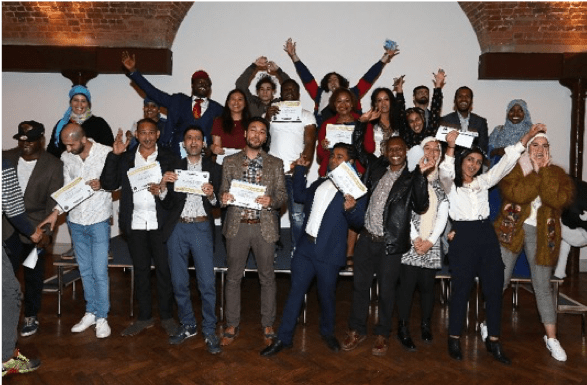 So, together, we started the Ice Cream Entrepreneurs (Ice) Academy program, an innovative model which works with people to develop their business ideas along with entrepreneurship training, mentoring and part-time employment. The program works with people to build some of the practicalities needed to start a business; like access to finance, networks and the tools needed to put their creative ideas into action. Ice Academy participants already have ingenuity, ideas and the experiences from their home countries, and the Ice Academy’s goal is to provide the tools, opportunities and resources to help them succeed in the UK and across Europe.
So, together, we started the Ice Cream Entrepreneurs (Ice) Academy program, an innovative model which works with people to develop their business ideas along with entrepreneurship training, mentoring and part-time employment. The program works with people to build some of the practicalities needed to start a business; like access to finance, networks and the tools needed to put their creative ideas into action. Ice Academy participants already have ingenuity, ideas and the experiences from their home countries, and the Ice Academy’s goal is to provide the tools, opportunities and resources to help them succeed in the UK and across Europe.
2018 was Year 2 for the Ice Academy. We have seen a successful expansion from 8 participants in the UK in 2017 to 50 participants in the UK, Germany and the Netherlands in 2018. We held a graduation ceremony for the UK graduates in September and invited friends and family, business partners and colleagues to celebrate their achievements.
The Ice Academy program has:
- Had a direct impact on the particpants’ progression pathway, whether that is to continue to develop their own business or into other forms of employment
- Unlocked new commercial opportunities and partnerships – key to ensuring the sustainability of the program
- Given us a platform to engage other businesses and policy makers
We are now in the process of evaluating the program’s impact and what changes we will look to make as we enter into Year 3 in 2019, including a focus on the sustainable financing of the program. Here's more info on the Ice Academy.
Start with A Friend—Germany
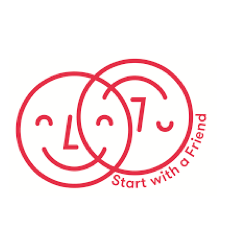 Our Start with A Friend campaign in Germany hit its 2018 target of creating 1,000 “tandems”—connections between refugees and locals based on shared values. Our NGO partner has been inundated with requests to engage in their program after our campaign, with their welcome events being oversubscribed. The campaign was a great example of using our data driven marketing approach to create social impact, with three phases - awareness / education / conversion. In our awareness phase we reached over 2 million people! Both building connections and changing the narrative are a key part of the European activism strategy on refugees, and we will be seeking to learn from this campaign to understand how to better support systemic change in these areas.
Our Start with A Friend campaign in Germany hit its 2018 target of creating 1,000 “tandems”—connections between refugees and locals based on shared values. Our NGO partner has been inundated with requests to engage in their program after our campaign, with their welcome events being oversubscribed. The campaign was a great example of using our data driven marketing approach to create social impact, with three phases - awareness / education / conversion. In our awareness phase we reached over 2 million people! Both building connections and changing the narrative are a key part of the European activism strategy on refugees, and we will be seeking to learn from this campaign to understand how to better support systemic change in these areas.
Right to Work—UK
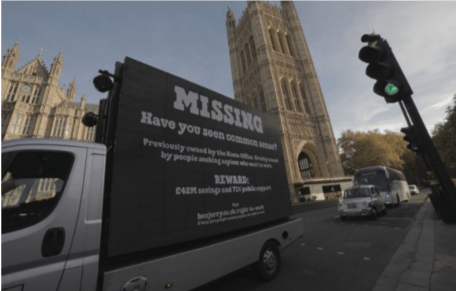 The coalition-wide petition to Lift the Ban on asylum seekers working was up to more than 23,000 signatures in 2018 – with more than half of that coming from Ben & Jerry’s channels. We’ve seen some great engagement online as well, with 7M impressions across all social channels, 60k total clicks on posts, and 15k likes and comments. We also took our campaign to the streets with a protest ‘Missing Common Sense’ banner being driven around Parliament, the driver of the van even reported that leader of the opposition Jeremy Corbyn gave a thumbs up to the banner!
The coalition-wide petition to Lift the Ban on asylum seekers working was up to more than 23,000 signatures in 2018 – with more than half of that coming from Ben & Jerry’s channels. We’ve seen some great engagement online as well, with 7M impressions across all social channels, 60k total clicks on posts, and 15k likes and comments. We also took our campaign to the streets with a protest ‘Missing Common Sense’ banner being driven around Parliament, the driver of the van even reported that leader of the opposition Jeremy Corbyn gave a thumbs up to the banner!
We’re seeing these efforts begin to land with decision makers, with more and more MPs speaking out on this issue in Parliament and adding their support! We saw this excellent contribution from Keith Vaz, MP in the Chamber, directly questioning Sajid Javid on the right to work at monthly Home Office questions and drawing a response from the Home Secretary that the Government is “looking at what more we can do”. We’ve also had a range of written parliamentary questions, including from Conservative MP Steve Double, and Labour MPs Yasmin Qureshi and Vicky Foxcroft.
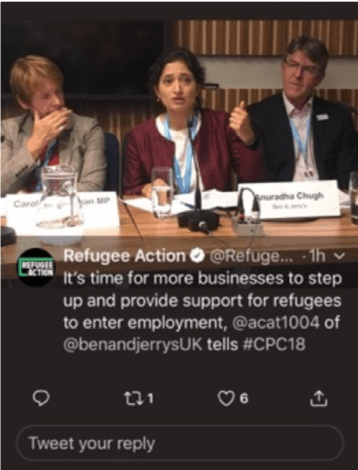 The entire Scottish Parliament have also voiced their support for this campaign and have called on their Westminster colleagues to give people the right to work. This is all amazing political support and will be critical in the run up to the Immigration Bill. We are still waiting to hear when the Immigration Bill will come to Parliament, it’s likely to be early in 2019. Ahead of the debate and any vote we will have a final push on decision makers to try and make our policy ask a reality!
The entire Scottish Parliament have also voiced their support for this campaign and have called on their Westminster colleagues to give people the right to work. This is all amazing political support and will be critical in the run up to the Immigration Bill. We are still waiting to hear when the Immigration Bill will come to Parliament, it’s likely to be early in 2019. Ahead of the debate and any vote we will have a final push on decision makers to try and make our policy ask a reality!
Ben & Jerry’s was invited to attend a learning visit to the European Parliament in 2018 alongside a select group of UK MPs and civil society groups to understand how Brexit will affect refugee and asylum policy in Europe. During the trip our work in 2018 was highly commended by the group, especially our Right To Work campaign in the UK. It’s excellent to see us having a credible and influential voice in this space after a number of years of activity. This is another reason why we believe focusing our efforts on refugee and asylum seeker issues in Europe will allow us to create greater impact.
Values Led Sourcing
Overview
In order to make great ice cream and create positive social change, Ben & Jerry’s continues to search for ingredient suppliers, all along the supply chain, who are aligned with our 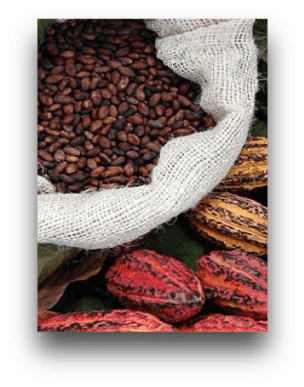 Company’s mission and core values. These are suppliers who, through their business practices or through their products, are expanding economic opportunities for those not afforded them, or leading the way to more sustainable environmental or agricultural systems. Our Values-Led Sourcing (VLS) program seeks to expand our values-led decisions in order to create better outcomes for more and more players within our supply chain.
Company’s mission and core values. These are suppliers who, through their business practices or through their products, are expanding economic opportunities for those not afforded them, or leading the way to more sustainable environmental or agricultural systems. Our Values-Led Sourcing (VLS) program seeks to expand our values-led decisions in order to create better outcomes for more and more players within our supply chain.
Dairy
Ben & Jerry’s dairy supply chain involves hardworking people, hardworking animals and a hardworking planet. Economic, environmental, and social complexity interweave on a dairy farm, presenting unique challenges and opportunities in advancing dignified livelihoods and mitigating the impact of climate change. Overall, the dairy sector is governed by myriad federal, regional, state and local rules and regulations – which are different for each country from which we source dairy. The global interplay between countries affects local markets and, in the US and Europe, the dairy sectors are subjected to pricing mechanisms that no longer address current farming pressures, resulting in volatile markets for dairy farmers. Building a model that can effectively grapple with these wide-ranging factors will take innovation and perseverance bolstered by support and insight gleaned from a broad group of dairy industry stakeholders.
Our vision is that all dairy used by Ben & Jerry’s comes from farms that have:
- Thriving and dignified livelihoods for farmers and farm workers
- Excellent care for cows
- A flourishing ecosystem:
- Feed grown ecologically, without use of harmful chemicals or GMOs, and in a way that protects water resources and promotes biological diversity
- Farm operations acting as a net carbon sink through minimizing GHG emissions and sequestering carbon in the soil
These outcomes will be underpinned by building soil health through regenerative agricultural practices and through public policy changes to address systemic barriers that make it difficult for farmers to transition to these practices.
Through support of regenerative agriculture farming practices and rewarding performance-based outcomes, we aim to promote better economic margins for farmers by improving farming operations which will drive and sustain dignified livelihoods for both farmers and farmworkers. Shoring up our launch of Milk with Dignity in 2018, we will continue to support farmworker human rights.
Progressive animal care is critical, not only from a compassionate humane perspective, but also for its implications in human and environmental health. We will continue to evolve our standards with the intent of setting a scalable model that can be expanded to the broader dairy sector.
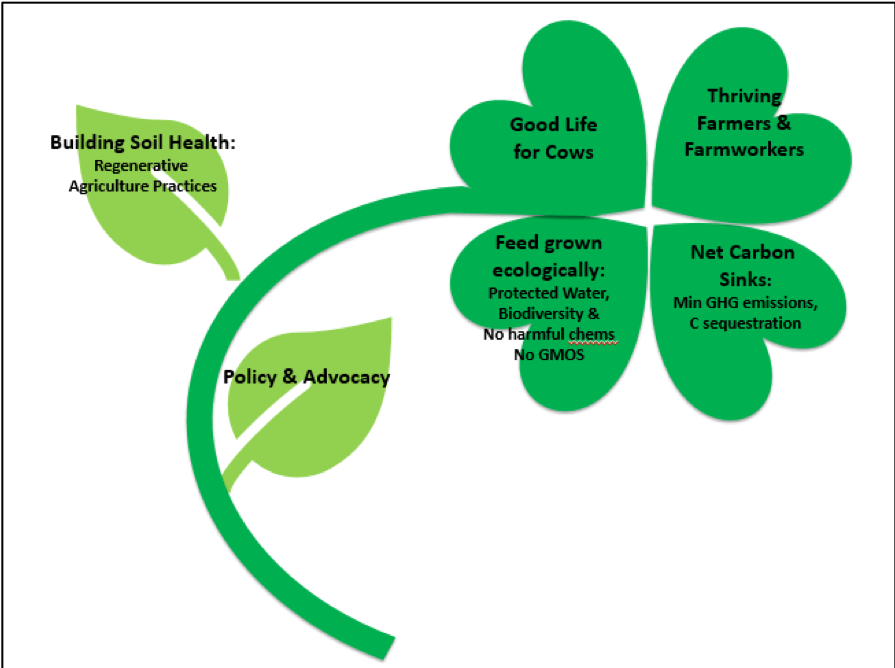 Supporting a thriving ecosystem is critical as a dairy farm actively participates in many eco-cycles. Reducing harmful chemical inputs (ie: herbicides, pesticides, and synthetic fertilizers) promotes healthy soil and supports clean water, which in turn supports increased balanced biodiversity, which cycles back to healthier soil and cleaner water, and so on. The soil is literally and metaphorically the foundation upon which the farm and its resiliency are built; the healthier the soil, the healthier the farm – environmentally and economically.
Supporting a thriving ecosystem is critical as a dairy farm actively participates in many eco-cycles. Reducing harmful chemical inputs (ie: herbicides, pesticides, and synthetic fertilizers) promotes healthy soil and supports clean water, which in turn supports increased balanced biodiversity, which cycles back to healthier soil and cleaner water, and so on. The soil is literally and metaphorically the foundation upon which the farm and its resiliency are built; the healthier the soil, the healthier the farm – environmentally and economically.
Building on the pioneering work already started to reduce farm GHG emissions, we are positioned to explore innovation which could enable farms to drawdown carbon out of the atmosphere, sequestering it in the soil through regenerative agricultural practices. We aspire to ultimately catalyze the conversion of dairy farms into net carbon sinks where farms sequester more carbon than they emit, thereby providing a critical service for the planet.
Caring Dairy - Vermont
The Ben & Jerry’s Caring Dairy Program was developed to support the dairy farmers we source from in adopting leading-edge agro-ecological management practices that cover the farm’s ecosystem, improving farm productivity while strengthening the overall health of the dairy farm. We have programs running in both the United States and the Netherlands. In the US, Phase I of Caring Dairy ran from 2011-2015. In 2016, we raised the bar and implemented a more rigorous program reflecting advances in farm management and practices. The new version, Caring Dairy 2.0, includes required components similar to the first version: complete an annual assessment of multiple farm management categories (animal, environmental, social; labor is covered under the Milk with Dignity Program), develop and implement two process improvement plans, and attend three workshops. Caring Dairy 2.0 also provides incentivized tiers of management and achievement for participating farmers: Basic, Silver, and Gold. All farmers participating in the program also agree to participate in third-party verification by Where Food Comes From, recognized as one of the world’s leading independent third-party food verification organizations. In 2018, participating farmers were paid a total of almost $3.6-million in additional premiums for achieving the standards in the three tiers.
2018 Results
2018 was a significant year for our Dairy Program. The current version of Caring Dairy – “2.0” – was designed to be a three-year program, 2016-2018 (Europe’s “2.0” program started in 2018). So, we were both winding down this phase of Caring Dairy while looking forward to what’s next for our Dairy Program. Also, 2018 was a landmark year because it was the first year we implemented the Milk with Dignity program, a worker-led program by dairy workers for dairy workers.
Over the course of three years, Caring Dairy farmers changed some aspects in the way they farm, with striking impacts. Many of these impacts are measured in the Metrics section of the Caring Dairy Assessment. While the total number of farms participating each year changes, there were 65 continuously participating farmers who completed the Metrics section of the assessment for all three years of Caring Dairy 2.0, from 2016 to 2018 (representing 2015-2017 cropping years), and their responses show the nature of their management changes.
Those 65 farmers reported that they almost doubled the percentage of annual corn acres that received a cover crop, planting cover crops on more than 80% of their cropped corn land in 2017. With more than 10,000 acres protected by cover crops, those Caring Dairy farmers preserved more than 10,000 tons of topsoil.1

In comparison to the 80% cover cropping rate by Caring Dairy farmers, Vermont farmers planted cover crops on 25,461 acres, or 28% of annual cropland acres (Figure 4). This was determined by participation in programs supporting cover cropping through USDA NRCS or Vermont Agency of Agriculture which provides the only direct tracking of cover cropped acres in Vermont (per Ryan Patch of Vermont Agency of Agriculture).
Caring Dairy farmers used no-till and/or shallow-till planting on almost 60% of cropped corn acres in 2017, increasing by 139% over the three years. No-till planting methods are estimated to reduce erosion by 85% or more.2 Farmers also put more acres into shorter crop rotations, rather than permanent corn, increasing biodiversity and vegetative cover, both big parts of soil health. The rate of 58% exceeds the 20% rate of cropped acreage in Vermont using shallow or no-till planting as seen in Figure 5 (direct communication, Ryan Patch tracking data through USDA and VT Agency of Agriculture assistance programs, Report On Farming Practices In Vermont.

The 65 continuously-participating Caring Dairy farmers also reported reduced electricity usage and increased milk production, demonstrating greater on-farm energy efficiencies. Farmers also tallied an overall decrease in fertilizer use, reducing phosphorus application by 100,000 pounds, as well as decreasing nitrogen and potassium use
Overall, the 72 participating farmers that completed the metrics in 2018, decreased fertilizer use and increased cover cropping and no-till use compared to Caring Dairy results of previous years. Over the past three years, Caring Dairy farmers preserved almost 30,000 tons of topsoil, due to cover cropping alone. See our 2018 Caring Dairy report for more info.
Milk with Dignity
Ben & Jerry’s Vermont Dairy Team worked closely with Migrant Justice (MJ) and the Milk with Dignity Standards Council (MDSC) to strengthen the 2018 roll-out of the Milk with Dignity (MD) program. We are pleased to report that we were ahead of schedule in reaching full enrollment in 2018:
- 71 participating farms
- 54 farms on “active status” with workers that qualify under the program
- 17 farms on “inactive status” because they do not have workers that qualify under the program
- 250 + farmworkers covered by the program
Read more on the Milk with Dignity Program.
Caring Dairy - Europe
We convened a 2-day dairy workshop early in 2018 in the Netherlands with a small team representing stakeholders for our European Caring Dairy program. The intent was to bring together a learning and brainstorming agenda covering EU consumer insights and marketing, market and supply analysis, regenerative agriculture developments and innovation from other agricultural sectors. The team was able to reflect and build upon the Dairy Vision, highlighting opportunities for the EU strategy to pick up traction. Since Caring Dairy 2.0 has just been rolled out in Europe, we had all of 2018 to bring more clarity to the next phase of our programming in Europe. The EU Dairy team also brought on a new co-op in Germany in 2018, shifting some of our EU dairy demand to a more suitable partner for our future work.
Next Steps
For 2019, Ben & Jerry’s Vermont Dairy Team has strategically modified Caring Dairy after assessing farmer capability and the direction Ben & Jerry’s is moving towards with our Values Led Dairy Vision. Branded Caring Dairy 2.1, the revised program will spur a stretch for farmers in the regenerative agricultural track and animal care module, without requiring changes likely to discourage continued participation.
Non-dairy Values-Led Sourcing:
Fairtrade; Cherries, Berries & Nuts; Eggs
While dairy is our single greatest ingredient by volume, comprising 40% of the pint, the remaining 60% is dominated by sugar, cocoa, nuts, and fruits; these ingredients are sourced from far and near, domestically and globally, and arrive at our manufacturing plants having already been refined, extracted, chunked, or swirled.
Our non-dairy Values-Led Commodities include:
- The Fairtrade supply chain of sugar, cocoa, vanilla, coffee, banana & almonds
- Cherries, berries and nuts
- Non-GMO corn, soy and canola
- Certified-humane cage-free eggs
The farmers of these commodity ingredients often fall victim to a race-to-the-bottom mentality in terms of price and quality; such commodity farmers are price-takers and struggle with market volatility. A key tenet of Values-Led Sourcing is to de-commoditize these ingredients so that the true value created by the farmers and along the value chain is fairly and appropriately captured and distributed amongst the many actors along the trading and processing chain. Currently, this is not the case and instead, processors who operate very far from the farm gate are capturing a disproportionate share of the value while many farmers struggle with pricing that does not meet their costs of production. Many of these ingredients are subject to federal regulation and tariffs and would benefit from advocacy and policy to support more fair trade.
Our challenge is that, in the context of global players in these supply chains, we are not major buyers of any of these commodities and therefore do not hold much commercial leverage. Instead, our influence arises from our connection to our fans and the goodwill of our brand. Scale arises from this potential, enabling us to raise awareness and bring others on the journey when we lean forward, willing to try something different to address broader social and environmental systemic challenges spanning dignified livelihoods for farmers and farmworkers, progressive animal care, healthy eco-systems, and climate change mitigation and resilience.
Most of our work in 2018 in these supply chains was in our Fairtrade-certified supply chains. Our plans in 2019 include deeper reviews of our cherries, berries and nut supply chains, our certified-humane cage-free eggs supply chain and our non-gmo supply chain.
The Fairtrade Producer Development Initiative (PDI)
Our partnership with Fairtrade arose because of like-minded ideology between Ben & Jerry’s 3-part mission, our Progressive Values principles and Fairtrade’s enterprise model of supporting farming cooperatives with trade, not aid. FT minimum price and premium mechanisms recognize the role of price within the broader context of farmer resilience and self-agency. Our work with Fairtrade International has fostered good synergy and momentum building with advancing Living Income across the Fairtrade network. We further drove this work through the Producer Development Initiative (PDI), established because we recognized that the Fairtrade model would benefit from a focused effort, willing to make deeper commitments to farmers that went beyond a price premium on a harvest. The PDI aimed to leverage the commitment of our commercial relationship (the Fairtrade ingredient purchase and social premium) across cocoa, sugar, vanilla, and almonds, with PDI project investment in the same communities. The strategy for each commodity was to partner through the supply chain with specific Fairtrade cooperatives in a linked prosperity relationship, understand the gap between the living income and current incomes, and innovate and invest to contribute to closing the gap.
The Fairtrade movement has strong roots and fan enthusiasm in Europe; there are greater challenges with fan awareness in North America. Strengthening the emotional connection between our fans towards our Fairtrade farmers is critical to sustain and grow momentum for the movement and, with our PDI experience, we are now ready to increase our focus on communicating our journey and its impact to our fans and other stakeholders. Looking forward, we aim to review the PDI strategy in 2019, assess the impact, and course-correct the roadmap towards advancing living income, cooperative strengthening, and climate resilience. Engaging with other thought partners and assessing the activity in the broader ethical sourcing landscape will provide insight and inspiration to evolve our strategy to maximize its effectiveness.

The Producer Development Initiative (PDI) applies a “3x3 strategy” across 5 ingredients: sugar, cocoa, vanilla, coffee, and Palestinian almonds. The PDI is intended to leverage the commitment of our commercial relationship (the Fairtrade ingredient purchase and social premium) with project investment in the same communities to achieve enhanced livelihoods and resilience. The strategy for each commodity is to partner through the supply chain with specific Fairtrade cooperatives in a “linked prosperity” relationship, understand the gap between the living income and current incomes, and innovate and invest to contribute to closing the gap.
3 Workstreams:
- Living Income – advancing the living income methodology; building alignment on methodology, benchmarking actual household income and living income, identifying the gap, evaluating PDI projects in the context of effectiveness in contributing to gap closure.
- Climate resilience – proactively embedding adaptation and mitigation strategies to support farming communities with climate change
- Cooperative strengthening – catalyzing producer empowerment through supporting independent, democratic organizations to improve their negotiating power with buyers, achieve economic stability, make joint investments and increase their collective influence
3 Platforms:
- Farmers – direct interventions with farmers, in the field, to support quality, yield improvements, crop diversification etc.
- Trading relationship – supporting direct “linked prosperity relationships” through the value chain; innovating for more added value at the cooperative stage where appropriate
- Industry influence – using our leverage to engage with our industry and sector peers to improve the enabling environment
In 2018, the Ben & Jerry’s team started scoping Fairtrade’s role in our 3 Year Plan (2019-2021) centered on linked prosperity with small-holder farmers. This work will continue to leverage Living Income strategies aimed to realize the dignified life for farmers.
PDI Update: Cocoa
The Cocoa PDI project, launched in Sep 2016 when Ben & Jerry’s partnered with 3 cooperatives in Cote d’Ivoire representing 4000 farmers, continues to build the capacity of those cooperatives 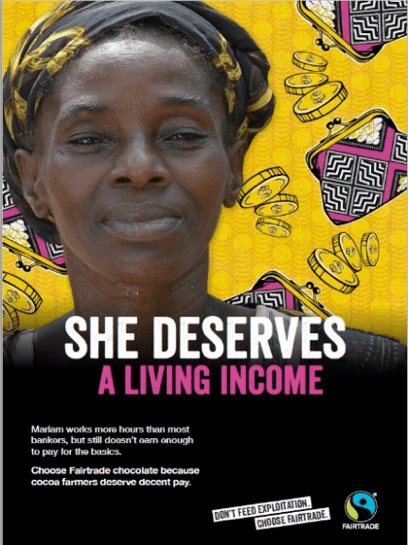 so that they develop more agency and become resilient business partners. The project also aims to increase the agronomic knowledge of cocoa farmers, providing them with productivity packages, which will support their journey to become entrepreneurial farmers achieving a living income. Working with Fairtrade Africa and our cocoa powder supplier as PDI implementation partners, this effort has the long-term potential to double current incomes, thereby achieving a living income, but faces challenges since the necessary productivity levels require large-scale replanting due to aging trees and naturally declining yields.
so that they develop more agency and become resilient business partners. The project also aims to increase the agronomic knowledge of cocoa farmers, providing them with productivity packages, which will support their journey to become entrepreneurial farmers achieving a living income. Working with Fairtrade Africa and our cocoa powder supplier as PDI implementation partners, this effort has the long-term potential to double current incomes, thereby achieving a living income, but faces challenges since the necessary productivity levels require large-scale replanting due to aging trees and naturally declining yields.
Early in 2018, Cote d’Ivoire announced that it would suspend programs intended to boost cocoa productivity for the next harvest (2018-2019) as a tactic to manage supply and increase commodity price. Basically, this means that our project can no longer enroll farmers into the ‘replanting package’ track; instead, we are going to support 20 farmers to replant some acres with medium term cash crops, thereby being ready for cocoa seedlings as soon as the suspension is discontinued.
Ben & Jerry’s cocoa project is linked to and has catalyzed the wider Fairtrade strategy to work towards a living income for cocoa farmers. Fairtrade International established a Living Income Reference Price for cocoa in Côte d’Ivoire and Ghana, providing the first target price for the industry based on living income benchmarks and consultation on farm costs. Fairtrade’s recent finding that 58% of Fairtrade cocoa households in Côte d’Ivoire live in extreme poverty, triggered the urgency to prioritize progress towards living incomes for cocoa farmers in West Africa. Announced in early December 2018, Fairtrade will also raise its Fairtrade Minimum Price (FMP) for cocoa from $2,000 to $2,400 per metric ton, marking a 20 percent increase. World cocoa prices plunged by more than a third and farmers bear the brunt of price volatility. Fairtrade is still the only certification scheme that has a mandatory minimum price, which acts as a safety net for farmers when market prices fall while allowing them to benefit when prices rise. 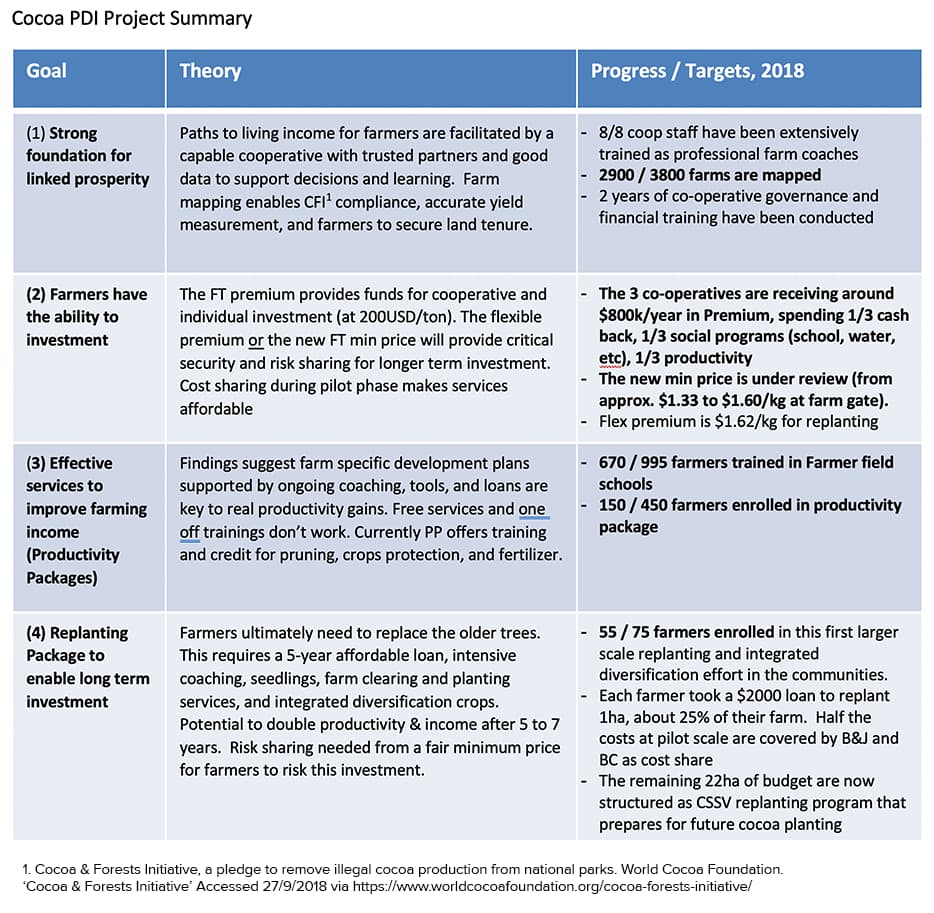 Additionally, the Fairtrade Premium will be increased from $200 to $240 per metric ton, the highest fixed premium of any certification program.
Additionally, the Fairtrade Premium will be increased from $200 to $240 per metric ton, the highest fixed premium of any certification program.
Vanilla, Madagascar
Since 2013, international vanilla prices have skyrocketed, going from $30-40/kg of cured vanilla, up to $500-600 in 2018. Although these high prices have significantly raised farm gate prices, they have also catalyzed high levels of theft from farmer fields and widespread pre-mature picking and trade with devastating effects on the quality. The PDI is looking ahead to the challenge of the next phase in the market when there is likely to be a significant price crash and oversupply. We believe that there is an important opportunity to improve farmer incomes in this next market phase (and reduce the boom and bust) by:
- Strengthening farmer organizations as business actors;
- Supporting farmers to return to traditional curing and capture the value-add benefit with part of their production; thereby moving towards higher income levels
- Getting farmer organizations closer to direct trade with the international market.
Vanilla, Uganda
Ben & Jerry’s has been investing with the Rwenzori Farmers Cooperative Union (RFCU) since 2016 to revitalize vanilla in Uganda. As in Madagascar, the international context has been challenging for farmers. Despite the problems, there have been significant and inspiring improvements in the livelihood of farmers as a result of the project investments and the high market price. 2018 marks the last year of PDI funding for this project. Key findings of the final project evaluation include:
- Net vanilla income increased from approximately 100 to 2500 USD (recognizing the inflated market price)
- Yield per vine increased from 350 g/vine to 1000 g/vine
- 63 active savings and loans groups with 1,691 people (1,732 women) members were created and trained
- Training of RFCU staff and selected members of the 14 primary cooperative societies
- The Ugandan vanilla industry has been successfully promoted and key mechanisms established to continue this work stream
These income gains have underscored the potential for vanilla to support a decent livelihood for farmers in Uganda. The key challenge moving forward is building the resilience of the farmer, and Uganda market as a whole, to the upcoming market price correction. Current industry thinking is evaluating the potential of the Uganda Vanilla supply to act as a high-quality market stabilizer to the Madagascar dominated vanilla market.
Sugar, El Salvador
The El Sunza sugar co-operative based in El Salvador currently grows Fairtrade sugarcane for Ben & Jerry’s North American supply chain. El Sunza consists of 209 members, who collectively cultivate 450 hectares of sugarcane in southern El Salvador. Climate change has hit Central America hard, with 4 years of consecutive drought stressing agricultural production. The drought and irregularity in rainfall have contributed to lower than optimal production for El Sunza. Moreover, despite having a female to male ratio higher than the national average, no women are members of the organization’s management committees and only 42% of members surveyed see the organization as inclusive. In this context, the PDI objectives are therefore:
- Increase sugarcane production and drought resistance through the implementation of an irrigation system and good agricultural practices (GAP) on 70 hectares of land
- Promote and implement a youth and gender inclusion policy
- Strengthen Cooperativa El Sunza’s administrative and managerial capacities.
A hydrogeological report was commissioned in 2017, which included recommendations on the irrigation system. Drilling on the irrigation system began in July 2018. Unfortunately, late in 2018, it became clear that the drilling was not successfully hitting water and the irrigation project is on hold to determine how to recover from the drilling failure. In September 2018, the CLAC team collected the baseline data on productivity, perceptions on youth and gender, and existing co-operative management systems and business planning processes.
The organization has set targets to increase productivity on the 70ha area of irrigated land from 83MT/ha to 110MT/ha. The baseline highlighted that average producer income for the 2017/2018 season fell to $818, compared to $878 in 2016/2017, highlighting the risks associated with climate change and unpredictable rainfall. In 2019, the community is also planning to implement a reforestation program, planting trees alongside the neighboring riverbanks as buffer zones to reduce the impact of erosion. This latter work stream is funded by Fairtrade Germany, who provided additional resource to the project to expand its scope.
Social Enterprise
By 2021 (and beyond), we are looking for greater success in fostering and growing our social enterprise supplier portfolio. This is a unique differentiator for Ben & Jerry’s; it is part of our DNA as a company, moving into this space of linked prosperity in our early years. The 30+ year relationship with the Greyston Bakery, as well as those with Rhino Foods and Sustainable Harvest, were established before Ben & Jerry’s scaled globally – these companies were able to grow with us and the momentum helped them keep pace.
Now, Ben & Jerry’s is a much larger, complex, global company under the mantle of a multi-national giant. The hurdles to meet our ingredient requirements, at the scale and with the manufacturing and quality standards against which we operate, are daunting enough for conventional suppliers let alone social enterprises whose primary objective is making progressive impact. With this context in mind, our VLS strategy is to implement a Social Enterprise Ladder—a tiered process that will better nurture potential social enterprise partners to methodically step up to more promising and impactful possibilities as Ben & Jerry’s suppliers. By supporting this VLS incubator process which will create capable suppliers, we aspire to have at least 60% of our chunks and swirls produced by social enterprise or B-Corp suppliers by 2030.
1 Personal communication. This estimate is based on calculations done by UVM Extension’s Jeff Carter, from RUSLE2 simulations. It is not based on in-field measurements. RUSLE2 is a Revised Universal Soil Loss Equation.
2 Pollock, C and Randall Reeder. Jan/Feb 2010 No Till Plenty of Positives. Resource Magazine. Published by ASABE – American Society of Agricultural and Biological Engineers
3 Note: There is very little data by which we can compare Vermont and New York Caring Dairy farmers to other farmers in the northeast. Based on what we have found, Caring Dairy farmers exceed the average rate of cover crop and no-till usage in Vermont. There is no data yet found on electricity or fertilizer use. Some information is still being sought through NRCS, Extension, and other organizations.
Climate & Carbon Reduction
Overview
We are well aware of the dire reports coming from the global community and scientific experts who tell us that the precipice of no return for our climate draws closer unless the global community responds with the proper urgency and convictions to make the changes we need to. At Ben & Jerry’s, we have put in place the steps to reduce our aggressively reduce our carbon footprint. And, while we don’t have it all figured out, we are leaning in to take steps forward that are moving us in the right direction.
Our Goals: Science Based Targets
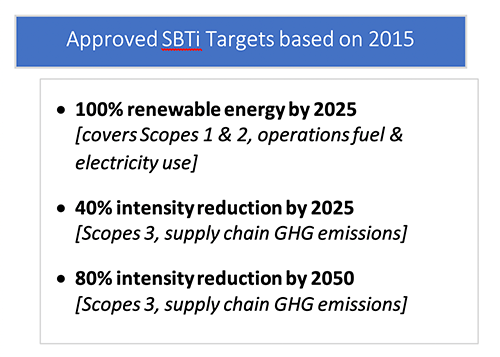 Ben & Jerry’s has established public goals through the Science Based Targets Initiative (SBTi) which set the long-term target for GHG emissions reductions. SBTi targets are meant to align with the global scientific recommendation to keep climate change below 2⁰C. Ben & Jerry’s is a pioneer in focusing on supply chain GHG emissions, with very aggressive Scope 3 targets. Even so, our overall GHG footprint is predicted to increase over the near term versus our 2015 baseline due to our healthy growth forecast. It is also important to keep in mind that the science behind SBTi is based on the minimum greenhouse gas reduction in order to avoid the most devastating effects of climate change. What the Earth actually requires of our industry may actually be substantially more. That is why we are planning to invest in research and pilot projects to enable future action to meet and exceed current targets while taking concrete actions today.
Ben & Jerry’s has established public goals through the Science Based Targets Initiative (SBTi) which set the long-term target for GHG emissions reductions. SBTi targets are meant to align with the global scientific recommendation to keep climate change below 2⁰C. Ben & Jerry’s is a pioneer in focusing on supply chain GHG emissions, with very aggressive Scope 3 targets. Even so, our overall GHG footprint is predicted to increase over the near term versus our 2015 baseline due to our healthy growth forecast. It is also important to keep in mind that the science behind SBTi is based on the minimum greenhouse gas reduction in order to avoid the most devastating effects of climate change. What the Earth actually requires of our industry may actually be substantially more. That is why we are planning to invest in research and pilot projects to enable future action to meet and exceed current targets while taking concrete actions today.
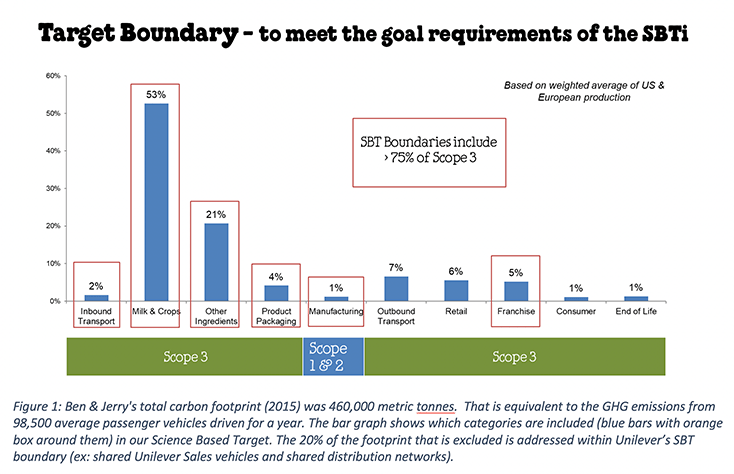 Ben & Jerry’s total carbon footprint in our baseline year (2015) was 460,000 metric tonnes (MT) of CO2e (or 3.3 lbs per pint) which includes the greenhouse gas (GHG) impact of milk & dairy crops, non-dairy ingredients, inbound & outbound transportation, packaging, manufacturing, retail, franchise, consumer, and end of life. We included 370,000 metric tonnes, or 2.67 lbs/pint, (~80%) in our 2015 baseline for Science Based Targets (SBT). We forecast our SBT footprint would increase to 578,000 MT by 2025 in a ‘business as usual’ scenario. It should be noted that even if Ben & Jerry’s meets intensity reduction goals (see below), we will still increase our overall footprint for years to come before it begins to decrease.
Ben & Jerry’s total carbon footprint in our baseline year (2015) was 460,000 metric tonnes (MT) of CO2e (or 3.3 lbs per pint) which includes the greenhouse gas (GHG) impact of milk & dairy crops, non-dairy ingredients, inbound & outbound transportation, packaging, manufacturing, retail, franchise, consumer, and end of life. We included 370,000 metric tonnes, or 2.67 lbs/pint, (~80%) in our 2015 baseline for Science Based Targets (SBT). We forecast our SBT footprint would increase to 578,000 MT by 2025 in a ‘business as usual’ scenario. It should be noted that even if Ben & Jerry’s meets intensity reduction goals (see below), we will still increase our overall footprint for years to come before it begins to decrease.
Climate Strategy
We are approaching our aggressive goals with a four-part strategy that focuses on Ben & Jerry’s main opportunities to make swift and effective change in our supply chain. Some parts of the strategy focus on near-term reductions, while others invest in research we will need to have medium-to-long-term reductions. The four parts are as follows:
1. Dairy: As 53% of our carbon footprint, it is easy to see why dairy will play a critical part of our success. Projects that address this category include the following:
- Manure projects such as on-farm manure separators and digester for medium-scale farms (200-400 cows)
- Dairy best practices that reduce emissions through ongoing efforts in the Caring Dairy program. This includes cropping initiatives such as no till, cover cropping and crop rotation as well as reductions in synthetic nitrogen applied to the soil via fertilizer.
- Research and pilot trials that focus on emerging approaches to sequestering carbon in the soil.
2. Non-dairy Ingredients: As 21% of our carbon footprint, Ben & Jerry’s ingredient supply chain (excluding dairy ingredients) is the 2nd highest carbon emitting category.
- a. In setting projects that reduce carbon emissions from the production of ingredients and the communities where they are sourced;
3. Product Portfolio & ingredient shifts
- Evaluating opportunities for recipe changes to existing product lines that reduce the carbon footprint without impacting consumer experience; this could include renovating our existing products with lower-carbon versions of the same ingredient; it could also include substituting ingredients that have a high emissions factor with others that have a lower emissions factor.
- Increasing the proportion of non-dairy products in our portfolio, which have a much lower carbon footprint than dairy based ice cream.
- Developing new products based on lower emissions factors or blending dairy & non-dairy bases to shift our overall intensity
4. Scope 1 & 2 emissions: Eliminating emissions from the fuel and electricity we use in company owned facilities by replacing them with renewable sources. Although Scope 1 & 2 are around only 1% of our total carbon footprint, these emissions reductions are an important part of our SBTi Targets.
We worked intently in 2018 to more clearly define our climate strategy and our path forward to reduce our carbon footprint. In our 3-year plan (2019-2021), the trajectory of our reductions is clearer now that there have been a variety of projects proposed. We have a variety of research proposals which look at soil health, pesticide/herbicide reduction, microbiology in soil, and cropping systems. We also have a variety of projects that we could pursue within our own supply chain. We are continuing to clarify how the carbon budget has been spent historically as well as how we will plan to use it in the future to meet our targets.
Our partners in this work are:
Pure Strategies Pure Strategies aims to transform business to create a more sustainable future. Since 1998, Pure Strategies has helped to build leading strategies for companies, improve products and packaging, and shifting supply chains toward better environmental and social performance. Pure Strategies is a certified B Corp.
NativeEnergy NativeEnergy helps businesses and individuals identify and reduce their greenhouse gas pollution and attain their sustainability goals. Based in Burlington, Vermont. NativeEnergy is an expert provider of carbon offsets, renewable energy credits, and carbon accounting software. NativeEnergy is a certified B-Corp.
Climate Activism:
Australia 2018 Overview
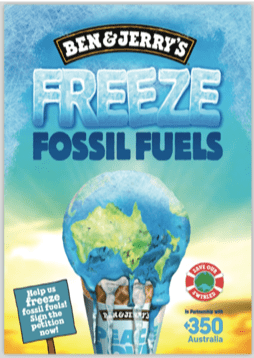 Despite Australia signing up to the Paris Agreement with a plan to reduce carbon emissions by 26-28% by 2030, Government data indicates that Australia will be about 140 million tonnes, or 30%, above that target. Our aim for 2018 was to help Australia to reduce its emission and stick to its commitments. We worked with long term partners 350.org Australia throughout the course of the year, supporting them at different flashpoint moments: their divestments campaign, their Accelerate Tour with founder Bill McKibben and their push for renewables and climate march.
Despite Australia signing up to the Paris Agreement with a plan to reduce carbon emissions by 26-28% by 2030, Government data indicates that Australia will be about 140 million tonnes, or 30%, above that target. Our aim for 2018 was to help Australia to reduce its emission and stick to its commitments. We worked with long term partners 350.org Australia throughout the course of the year, supporting them at different flashpoint moments: their divestments campaign, their Accelerate Tour with founder Bill McKibben and their push for renewables and climate march.
Freeze Fossil Fuels & the Accelerate Tour
Australian governments and institutions continue to invest in expanding access to fossil fuels, moving us ever closer towards a future of disastrous climate change. The fossil fuel divestment movement, led by 350.org calls on institutions around the world, 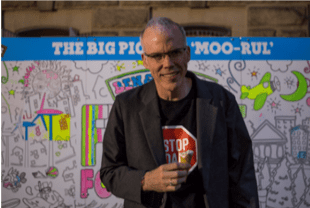 from churches and non-profits to schools and universities, to sell off their holdings from fossil-fuel businesses.
from churches and non-profits to schools and universities, to sell off their holdings from fossil-fuel businesses.
Increasingly, we cannot rely on federal or national governments to make the environmental policy changes we need, in the timeframe we need them. So, with 350.org, we took our fight to the people and to local councils. In Australia, through our Freeze Fossil Fuels campaign we continued our divestment push and helped our fans to call on their local councils to divest.
The ‘Accelerate’ tour was about inspiring people to join forces, using their combined pressure to speed up action and support the move away from fossil fuels. Bill spoke about targeting the fossil fuel industry through divestment as one of the most powerful ways of ensuring that happens. 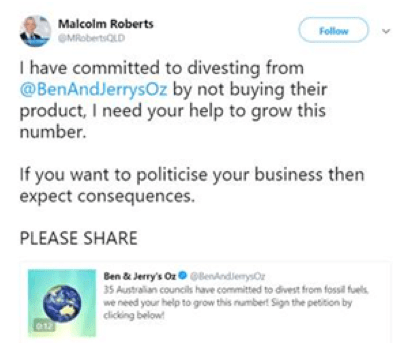 We supported the tour by scooping at 3 of the 5 events, engaging people and helping 350 to reach new audiences.
We supported the tour by scooping at 3 of the 5 events, engaging people and helping 350 to reach new audiences.
Campaign Calls to Action and Results
- Attendee’s at Accelerate Tour: 1700+
- Volunteers at each event: About 60
- Online signatures for petition: 1,319
- Boycott by MP: 1 (see tweet)
Gimme S’more Renewables
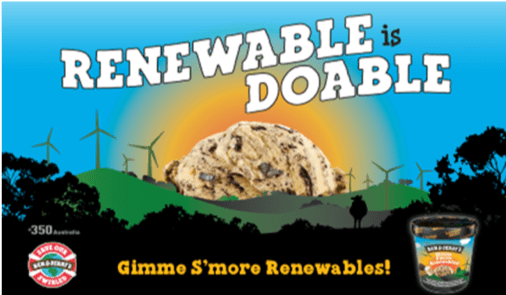 The Australian government was in turmoil and, in August 2018, disagreements over climate change policy led to revolt and the removal of another Prime Minister. This meant that we could not rely on federal or national governments to make the environmental policy changes we needed, in the timeframe we need them.
The Australian government was in turmoil and, in August 2018, disagreements over climate change policy led to revolt and the removal of another Prime Minister. This meant that we could not rely on federal or national governments to make the environmental policy changes we needed, in the timeframe we need them.
To raise awareness of the issues we unveiled a new limited-edition flavor Gimme S’More Renewables - a direct plea to Australian politicians to step up action on climate change and commit to building a fossil-fuel free world by accelerating Australia’s move to renewable energy.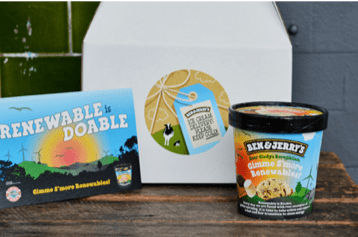
To make sure this was noticed by key politicians we sent personalized pints of the Gimme S’More Renewables ice cream to key federal and state politicians in a personal plea to support renewable energy and put an immediate end to new fossil fuel projects. To show politicians that the public support a switch to renewables we asked fans to join us and long-term climate activism partners 350.org Australia at #RiseforClimate, a global day of climate action.
Fans are also able to send a message to their own local politicians via postal services installed at Ben & Jerry’s Scoop Shops. The message we want fans to help send is simple: ‘Renewable Is Doable’, we want you to support renewable energy policy and a fast, fair and just transition to renewable energy across the country.
Campaign Objectives
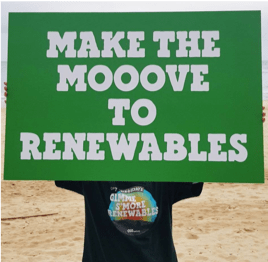
- Raise public awareness and understanding of the need for renewables
- Show politicians that the public wants them to support renewables
- Lobby the 14 councils where we have a local Ben & Jerry’s scoop shop that has not already divested, to divest.
Campaign Calls to Action and Results
- Encourage fans to take action by joining us at #RiseforClimate showing politicians that they want them to take climate action.
- PR Reach: 5,913,131
- 6,000 people participated in 52 events across Australia. Hundreds protested outside new PM’s office, including people from B&Js, the scoop stores and Unilever
2019 Plans
The latest Australian government figures show the country’s carbon emissions continue to rise, at a rate significantly higher than recent years. In fact, excluding certain emissions for which the calculations are controversial, emissions are at a record high. The party currently in power is pro-coal and has no climate change policy, this comes at a time when droughts, forest fires and other climate change related impacts are being felt across Australia. The federal elections will be held in 2019 and, in partnership with local grass roots organizations, we will work to ensure that climate is a key issue on the public agenda.
Japan: Coal Financing
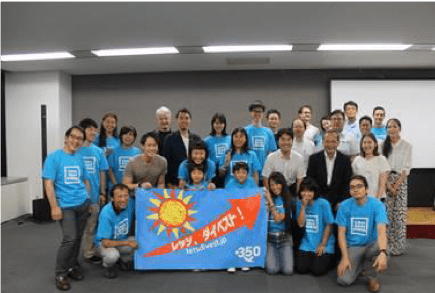 When it comes to financing coal and other fossil fuels, Japan’s banks are the biggest investors, in fact Japanese banks are the 1st, 2nd and 5th biggest investors in fossil fuels globally. Very few of these banks have transparent climate change policies and not many Japanese people know that they are unwittingly supporting the negative effects of climate change.
When it comes to financing coal and other fossil fuels, Japan’s banks are the biggest investors, in fact Japanese banks are the 1st, 2nd and 5th biggest investors in fossil fuels globally. Very few of these banks have transparent climate change policies and not many Japanese people know that they are unwittingly supporting the negative effects of climate change.
In March 2018, we held a workshop with 350.org Japan who were running a “Let’s Divest” campaign calling on individuals and companies to switch their bank accounts to “Earth Friendly Banks” that do not fund fossil fuels or nuclear power. The campaign aims to collect as many personal and organizational divestments as possible, and to lobby banks to divest from fossil fuels and nuclear energy and transition finance flows towards a 100% renewable energy society. We supported the campaign by amplifying what they were doing on digital and providing a new audience.
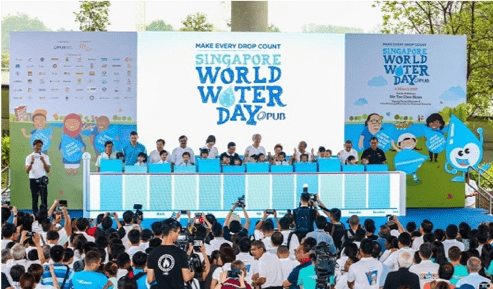
Singapore: World Water Day Singapore
Singapore World Water Day (SWWD) was celebrated throughout the month of March (2018). "Make Every Drop Count", was 2018’s theme and underpins the active role each of us, and businesses, can play to reduce water waste. While this is not the usual campaign that Ben & Jerry’s would be involved in, Ben & Jerry’s was approached and asked directly by the government to be involved. This is an important recognition of the role we play in climate discussions in Singapore and will hopefully mean that more open dialogue about climate campaigns is possible in the future.
2019 Plans
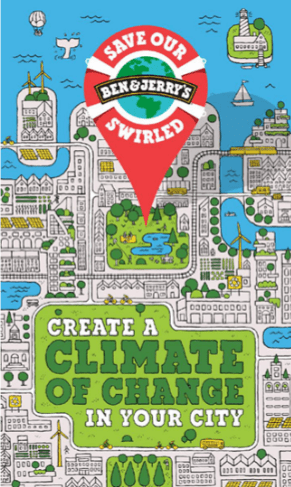 While the Paris Agreement was a positive step in tackling climate change, global carbon emissions are projected to increase by 2.7% in 2018, following a growth of 1.6% in 2017. The recent Intergovernmental Panel on Climate Change’s (IPCC) 1.5 degrees report, warned the world would have to cut greenhouse gas emissions by about 45% by 2030 (in just 12 years) to potentially avoid some of the worst effects of climate change – a dramatically increased risk of drought, flood, extreme heat and poverty for hundreds of millions of people. Many of these effects are already being felt by the poorest people in the world, people who do not have the ability to protect themselves or bounce back after disaster.
While the Paris Agreement was a positive step in tackling climate change, global carbon emissions are projected to increase by 2.7% in 2018, following a growth of 1.6% in 2017. The recent Intergovernmental Panel on Climate Change’s (IPCC) 1.5 degrees report, warned the world would have to cut greenhouse gas emissions by about 45% by 2030 (in just 12 years) to potentially avoid some of the worst effects of climate change – a dramatically increased risk of drought, flood, extreme heat and poverty for hundreds of millions of people. Many of these effects are already being felt by the poorest people in the world, people who do not have the ability to protect themselves or bounce back after disaster.
In 2019 we will continue to i) educate fans about climate issues through digital storytelling particularly on the importance of the Paris commitments; and ii) support local grass-roots organizations and the local climate movement by using our brand voice to highlight the issues and encouraging fans to take action. We will also ask fans to support the global Avaaz petition (recently updated), calling on politicians to keep global temperature rise under 1.5C by delivering clear plans that phase out carbon pollution to zero before 2050, and rapidly shift our societies and economies to 100% clean energy.
Climate Campaign—France
Our petition in France in 2018 to include action on climate change in the rewriting of the French Constitution passed 70,000 signatures. A January 2019 date had been set for the French Assembly to debate this topic, though unfortunately the “gillet jaune” (yellow vest) protests in France led to the debate being delayed until March 2019. Despite this, the team pushed ahead with a digital effort to support the campaign due to the momentum created during Q4-2018. The team will continue to demonstrate in 2019 alongside our NGO partner CliMates, with the aim of influencing the policy makers and getting national attention to the campaign at the critical advocacy moments.
 United Kingdom wind energy campaign – Blown Away
United Kingdom wind energy campaign – Blown Away
Since 2015, the UK government has effectively banned new onshore wind projects from being built in the UK, largely through new planning guidance for onshore wind projects in England, which has made it all but impossible to get onshore wind through the planning system. Our partner’s analysis shows this guidance has led to a 94% reduction in the number of applications for new projects in England.
This amounts to an effective ban on onshore wind – the UK’s cheapest source of renewable energy and a crucial part of the UK’s energy mix if it is to transition away from fossil fuels. In 2018, we worked with our partner ‘10:10’ to dismantle the barriers the UK government has put in the way of onshore wind energy, so that onshore wind can fulfill its potential in decarbonizing the UK energy system.
The government is about to publish a proposal for a new national planning permission framework. Our campaign, bringing in as many wind-based puns as possible (Strawberry Breeze-cake, anyone?) asks the government to use this framework to lift the ban on onshore wind projects. The people are on our side – we know that 76% of the UK population are in support of onshore wind (in comparison with just 13% for fracking, and with 75% of people who say they like ice cream!).
PACKAGING & MATERIALS
Sustainable Pints (US) & Tubs (UK)
In 2018 we established two important packaging goals: 1) making our pint (US) or tub (EU) recyclable & 2) making the pint package biodegradable.
- Sub-goal 1: The big idea is to reduce from 2-sided to 1-sided coating for Europe. Changing from 2-sided coating to 1-sided will allow our tubs to be recyclable in most European countries and seems to be on track to launch in 2019. In the US the solution for ‘recyclable’ is not quite that simple. Communities must actually collect ice cream pints in their recycling programs in order for a company to claim recyclability and the current collection rate is below 10%. Therefore, the US business is very focused on achieving a compostable cup (Sub-Goal 2).
- Sub-goal 2: The European team is working with a paper mill that claims to have a proprietary coating that can pass compostability standards in the EU and the US. More review is necessary. On the US side, a supplier of PLA, a plant-based plastic that is certified compostable, shows potential, but still needs to complete testing phases.
Scoop Shop Materials
In 2018, we made the decision to eliminate single-use plastic from our scoop shop network starting with plastic straws and spoons. The straw and spoon transition should be completed early in 2019.
- Eliminating about 2.5-million plastic straws
- Eliminating about 30-million plastic spoons
Our Company
How We Work
Since our acquisition in 2000, Ben & Jerry’s remains a wholly owned subsidiary of Unilever. Today, our packaged ice cream, novelties & new non-dairy products are sold all over the world, primarily as packaged products through retail outlets. Additionally, our euphoric flavors can be found in one of our over 600 scoop shop outlets, which operate, as of 2018, in 22 different countries!
Our products are produced in pints, quarts, 500 ml cups, 2.4 gallon, 9.08 liter and 4.5 liter tubs, single-serve cups and individual novelties; and these are distributed in supermarkets, grocery stores, convenience stores, scoop shops, restaurants and other venues. By the end of 2018, Ben & Jerry’s products were marketed and distributed in 38 countries throughout the world by affiliated companies within Unilever, and a third-party licensee in Israel.
In terms of the basics, Ben & Jerry’s global business is managed out of our Central Support offices in South Burlington, Vermont. Ben & Jerry’s sits within Unilever’s Food & Refreshments division, which was managed globally in 2018 out of London and regionally from Unilever offices in Englewood Cliffs, New Jersey.
Governance
Based on a unique acquisition agreement, Ben & Jerry’s and Unilever set up a governance structure that was unprecedented at the time and served to keep Ben & Jerry’s thriving in perpetuity as a values-led company.
Ben & Jerry’s Board of Directors
 Our CEO, Matthew McCarthy, receives direction, counsel and support from an independent Ben & Jerry’s Board of Directors (the Board), established at the time of the Unilever acquisition. The Board is responsible for Ben & Jerry’s Social Mission. It is also responsible for the Essential Integrity of Ben & Jerry’s, which includes, among other things, product quality and standards. In this role, the Board provides clear direction to Ben & Jerry’s senior management in maintaining and advancing the Company’s three-part Mission Statement and protecting Ben & Jerry’s brand equity. As the business continues to grow globally, the Board remains focused on making sure the Company’s three-part mission remains intact and at the core of what we do.
Our CEO, Matthew McCarthy, receives direction, counsel and support from an independent Ben & Jerry’s Board of Directors (the Board), established at the time of the Unilever acquisition. The Board is responsible for Ben & Jerry’s Social Mission. It is also responsible for the Essential Integrity of Ben & Jerry’s, which includes, among other things, product quality and standards. In this role, the Board provides clear direction to Ben & Jerry’s senior management in maintaining and advancing the Company’s three-part Mission Statement and protecting Ben & Jerry’s brand equity. As the business continues to grow globally, the Board remains focused on making sure the Company’s three-part mission remains intact and at the core of what we do.
Throughout 2018, the Ben & Jerry’s Board worked with management and staff to develop a three-year plan for 2019-2021. The Board continues its work focusing the Company on its over-arching business vision of a sustainable model of linked prosperity for all of Ben & Jerry’s stakeholders, from seed to freezer. Moreover, the Board remains deeply involved in examining issues of race, class and gender equity – inside & outside the organization.
The Ben & Jerry’s Board is made up of global leaders in social, economic and environmental advocacy and activism. Our Board is growing more diverse and has been proactive in recruiting new members with the experience and expertise they will need to address the complex issues we will face in years to come. The Board meets in full on a quarterly basis and conducts ongoing committee work throughout the year.
Our 3-Part Mission
Ben & Jerry’s is founded on and dedicated to a sustainable corporate concept of Linked Prosperity. Our mission consists of three interrelated parts:
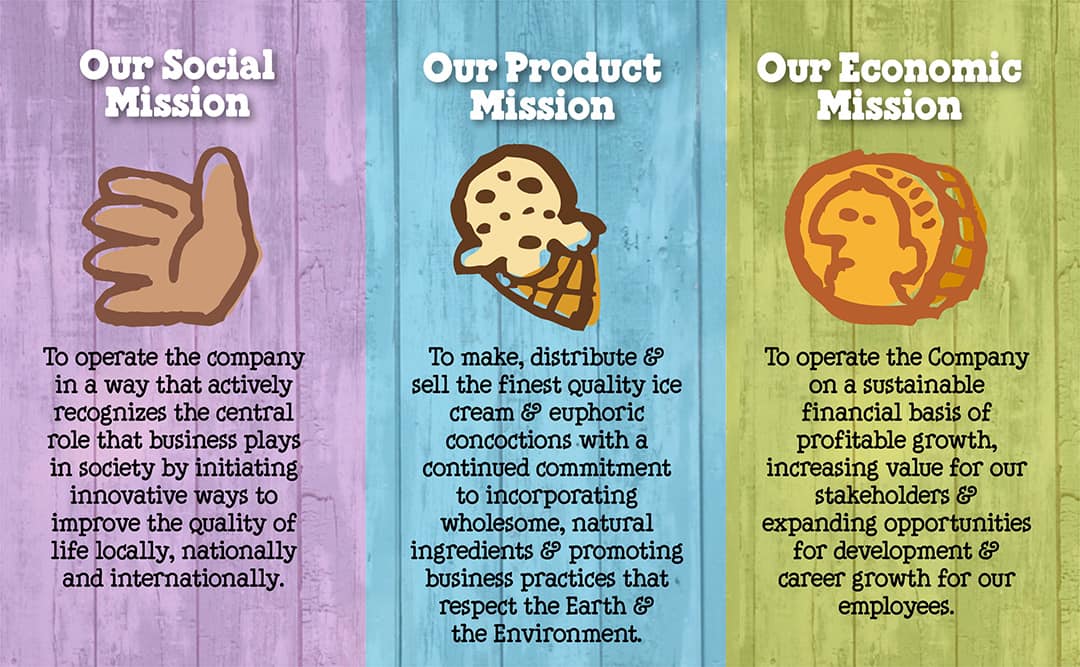
Product Mission
To make, distribute and sell the finest quality ice cream and euphoric concoctions with a continued commitment to incorporating wholesome, natural ingredients and promoting business practices that respect the Earth and the Environment.
Economic Mission
To operate the Company on a sustainable financial basis of profitable growth, increasing value for our stakeholders and expanding opportunities for development and career growth for our employees.
Social Mission
To operate the company in a way that actively recognizes the central role that business plays in society by initiating innovative ways to improve the quality of life locally, nationally and internationally.
Central to the Mission of Ben & Jerry's is the belief that all 3 parts must thrive equally in a manner that commands deep respect for individuals in & outside the Company & supports the communities of which they are a part.
While the principles underlying the three-part Mission help guide our day-to-day decisions, our Progressive Values Statement serves as an enduring reminder of our core beliefs.
Progressive Values Statement
Leading with Progressive Values Across Our Business
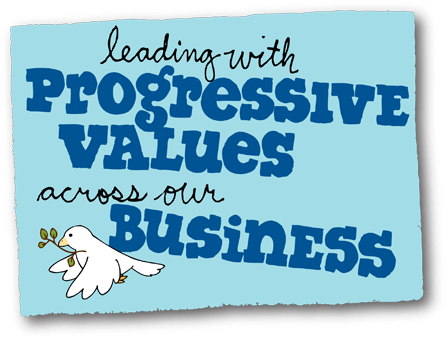
We have a progressive, nonpartisan Social Mission that seeks to meet human needs and eliminate injustices in our local, national, and international communities by integrating these concerns into our day-to-day business activities. Our focus is on children and families, the environment and sustainable agriculture on family farms.
- Capitalism and the wealth it produces do not create an opportunity for everyone equally. We recognize that the gap between the rich and the poor is wider than at any time since the 1920s. We strive to create economic opportunities for those who have been denied them and to advance new models of economic justice that are sustainable and replicable.
- By definition, the manufacturing of products creates waste. We strive to minimize our negative impact on the environment.
- The growing of food is overly reliant on the use of toxic chemicals and other methods that are unsustainable. We support sustainable and safe methods of food production that reduce environmental degradation, maintain the productivity of the land over time, and support the economic viability of family farms and rural communities.
- We seek and support nonviolent ways to achieve peace and justice. We believe government resources are more productively used in meeting human needs than in building and maintaining weapons systems.
- We strive to show deep respect for human beings inside and outside our company and for the communities in which they live.
A Sustainable Model of Linked Prosperity
Within the preamble of our three-part Mission Statement, which was written in 1988, is the dedication to “a sustainable corporate concept of linked prosperity.” Numerous academics and progressive business visionaries have advocated for similar models in recent years, which is a solid affirmation of our model, but we’ve been working on strengthening it, bringing new meaning to it, ever since. We’re still working on it. We always will be.
What we envision with our Linked Prosperity model is that as the company prospers, all those touched by the company must also prosper, including employees, suppliers, customers, and communities. It’s a simple idea, really, but it takes a lot of work by a lot of people, day in and day out, to make it happen.
Some of the more long-standing examples of linked prosperity at Ben & Jerry’s include:
- Our livable wage policy.
- Our ongoing support for family dairy farms.
- Our commitment to supporting small-holder agricultural producers by purchasing Fairtrade-certified ingredients.
- Our investment in values-led sourcing partnerships such as with the Greyston Bakery in Yonkers, NY, where they hire people with barriers to employment and empower them with skills training, a renewed sense of dignity and a paycheck at the end of the week.
We do believe that as the individual benefits the community benefits, benefitting all. Linked Prosperity must create benefits for the individual, the community, the planet; it’s all linked. Throughout 2017 and into 2018, we continued to explore what a sustainable corporate concept of linked prosperity means today, in all its forms.
Our Scoop Shop Community
2018 Overview
Our franchise community is made up of passionate, committed scoop shop owners who live in and care about the communities where their scoop shops are located. In 2018, through our 590 global scoop shops, we continued to take steps within our franchise community that presented opportunities to be engaged in our Social Mission and develop their management and staff to do so too.
One of our key programs is the Ben & Jerry’s Core Academy. The Core Academy is an online curriculum we developed in partnership with Champlain College, which is based in Burlington, VT. The Academy is designed to help students with a variety of life skills that can help them while they are part of the Ben & Jerry’s family and long after they may move on to other endeavors. The Core Academy provides the student with four course options:
- Beyond the Job: a course in a variety of beneficial life skills and emotional intelligence
- The Activism Academy: How we can become effective advocates and activists
- Making a Difference: Deeper concepts that can lead to creating a social enterprise
- Social Equity in Action: Developing an inclusive, diverse, equitable view of the world
In 2018, we had 84 graduates from the Core Academy. We are encouraged about the interest in the Academy, the high percentage of those completing the program and the positive feedback we are receiving from attendees. We have people signing up from throughout the company: scoop shops, manufacturing, regional offices around the world and our Central offices in Vermont. We intend to continue to improve and add to the Academy to provide the Ben & Jerry’s community with these effective courses.
Our scoop shops throughout the world participate in a variety of campaigns that reflect our annual Social Mission priorities that address issues of social, economic and environmental justice (which are highlighted elsewhere in this report link). They also support local non-profits and community groups that address local concerns.
B Corp Certification
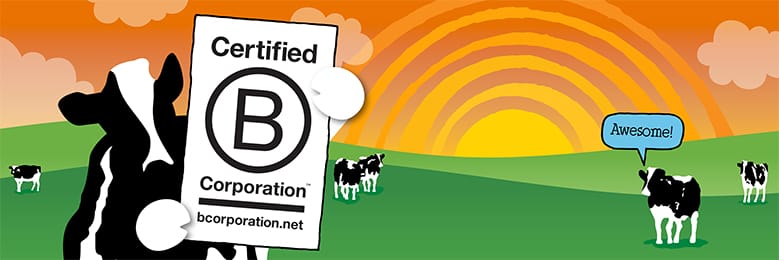
Certified B Corporations, or B Corps, are a new type of corporation that uses the power of business to solve social and environmental problems. Certified B Corps must satisfy a rigorous assessment by the non-profit B Lab that covers: corporate governance, worker benefits, community engagement, and environmental performance.
In 2012, Ben & Jerry’s became the first wholly-owned subsidiary in the world, with full support from our parent company, Unilever, to gain B Corp Certification!
In late 2016, we completed our third recertification cycle (a two-year term), increasing our overall score on the B Impact Assessment to 110 points (up from 101 in 2014)! Since the 2016 Assessment completed its assurance process in 2017, we will be renewing our Assessment in 2020.
Learn more about B Corporations and view Ben & Jerry’s Impact Assessment.
We are proud to have recognized the efforts of other B Corps with whom we work, at various levels and stages of our value chain3
The Greyston Bakery
Based in Yonkers, New York, the Greyston Bakery has been supplying Ben & Jerry’s with chocolate brownies for our Chocolate Fudge Brownie flavor for close to three decades. At Greyston, producing great baked goods is part of their greater-good mission to provide jobs and training to people with barriers to employment.
The Bakery is owned by the Greyston Foundation, a nonprofit organization with a mission to support people with barriers to employment on the path to self-sufficiency. Through their open-door hiring policy, when a job becomes available, the next person on the waiting list is given a job starting in an apprentice program, no questions asked.
Greyston’s programs reach over 2,000 people a year through childcare, housing, counseling, health care, and other services. Over the lifetime of our business relationship with Greyston, over 3,200 jobs have been created through the Bakery and over 19,000 families have benefitted through the Greyston organization’s programs and services. The Greyston Bakery is a certified B Corp.
Rhino Foods
Rhino Foods is another longtime supplier that makes those incredible gobs of cookie dough we use in our Chocolate Chip Cookie Dough ice cream. Based right here in Burlington, Vermont, Rhino became a certified B Corp in 2013.
Over the years, Rhino has developed a variety of programs that support its employees and the surrounding community. Rhino employs dozens of people who have come to the United States as refugees from all around the world. Through a unique variety of support programs, Rhino helps these and all of its employees to earn a living, save money, develop a credit history, and make a new life for themselves and their families.
Sustainable Harvest
Sustainable Harvest® is an importer of high-quality specialty-grade coffees from over 15 countries around the world. In addition to being a key actor in our Fairtrade coffee value chain, Sustainable Harvest® is also a certified B-Corp.
Macphie
Based in Scotland, Macphie is a supply partner for the cookie dough used in Ben & Jerry’s products made in the EU. In 2015, Macphie became one of the first UK companies to achieve B-Corp certification.
NativeEnergy
NativeEnergy is an expert provider of carbon offsets, renewable energy credits, and carbon accounting software. NativeEnergy helps businesses and individuals identify and reduce their greenhouse gas pollution and attain their sustainability goals. Based in Burlington, Vermont, NativeEnergy is a certified B-Corp.
Pure Strategies
Pure Strategies aims to transform business to create a more sustainable future. Since 1998, Pure Strategies has helped to build leading strategies for companies, improve products and packaging, and shifting supply chains toward better environmental and social performance. Pure Strategies is a certified B Corp.
General Operations
Ben & Jerry’s products for the North American market are made in our manufacturing plants in Waterbury and St. Albans, Vermont, as well as in a Unilever facility in Henderson, Nevada. Ben & Jerry’s ‘Pint Slices’ are made at a Unilever facility located in Covington, Tennessee. Additionally, we continue to make products for the Canadian market in a Unilever facility in Simcoe, Ontario. During 2018, Ben & Jerry’s products for European markets were produced at a Unilever factory in Hellendoorn, the Netherlands; while the ‘Wich’ novelty sandwiches were made by a co-packer in Greece. Products for Asia, Australia & Brazil were exported from these U.S. and European facilities.
At the end of 2018, 180 employees reported into Ben & Jerry’s Central offices in South Burlington, Vermont. During this same period, our Vermont Manufacturing sites employed 339 people in and around the communities of St. Albans & Waterbury, Vermont.
Quality of Life
A core principle at Ben & Jerry’s is to improve the quality of life for Ben & Jerry’s employees and all those who are touched by the Company, inside and out. One manifestation of that is to ensure that Ben & Jerry’s pays its workers a Livable Wage. Our Livable Wage policy continues to cover all full and part-time employees in our Vermont manufacturing plants and all full-time employees in our company-owned scoop shops. In 1995, we established a methodology for calculating a livable wage benchmark for Vermont. We defined it as the starting wage for a single person that will sustain a reasonable quality of life, taking into consideration essential expenditures on needs such as:
- Housing, utilities & transportation
- Nutritious food
- Out-of-pocket health care
- Recreation
- Savings, taxes, and miscellaneous expenses
In 2018, we paid an entry-level hourly livable wage rate of $17.61, which translates to approximately $36,630, per year. To put this into some context, at year-end 2018, the Vermont minimum wage was $10.50/hr. ($21,840/yr.), while the federal minimum wage was $7.25/hr. ($15,080/yr.). On January 1, 2019, the Vermont minimum wage increased to $10.78/hr. ($22,422/yr.), while the federal minimum wage has remained constant since 2009.
We continue to review how our livable wage stands up for the primary employees who make Ben & Jerry’s products outside of our Vermont manufacturing sites; including Hellendoorn, in the Netherlands.
Tracking Ben & Jerry’s Livable Wage (Vermont basis)
2018 - $17.61
2017 - $17.26
2016 - $17.09
2015 - $16.92
2014 - $16.29
2013 - $16.13
Code of Business Principles
All of the suppliers for Ben & Jerry’s ice cream are expected to follow practices consistent with the Code of Business Principles of our parent company, Unilever. This code includes continuous improvement in managing environmental impacts, safe and healthy standards for workers, and a firm commitment to human rights, among other things. Unilever is also a signatory to the U.N. Secretary General’s Global Compact of 1999, which commits the company to support and respect human rights within our sphere of influence.
Giving Back
The Ben & Jerry’s Foundation
 The Ben & Jerry’s Foundation was created in 1985, with an initial gift from Ben of 50,000 shares of Ben & Jerry’s stock and an unprecedented decision of the company’s Board of Directors to commit 7 ½% of the company’s annual pretax profits to philanthropy. Following the acquisition of Ben & Jerry’s by Unilever in the year 2000, the for-profit Ben & Jerry’s provides annual funding to the non-profit Ben & Jerry’s Foundation under a funding formula memorialized within the acquisition agreement that allows for the funding to grow as the company’s sales volume grows. In 2018, the Company contributed a total of $3,631,000 to the Ben & Jerry’s Foundation.
The Ben & Jerry’s Foundation was created in 1985, with an initial gift from Ben of 50,000 shares of Ben & Jerry’s stock and an unprecedented decision of the company’s Board of Directors to commit 7 ½% of the company’s annual pretax profits to philanthropy. Following the acquisition of Ben & Jerry’s by Unilever in the year 2000, the for-profit Ben & Jerry’s provides annual funding to the non-profit Ben & Jerry’s Foundation under a funding formula memorialized within the acquisition agreement that allows for the funding to grow as the company’s sales volume grows. In 2018, the Company contributed a total of $3,631,000 to the Ben & Jerry’s Foundation.
Ben & Jerry’s Foundation Funding Over Recent Years:
2008 = $ 1,945,000
2013 = $ 2,530,000
2018 = $ 3,631,000
The Ben & Jerry’s Foundation interests are in social justice, protecting the environment and supporting sustainable food systems. The Foundation is committed to supporting non-violent, thoughtful and strategic approaches that are utilizing grassroots organizing strategies to work for social change.
The Foundation’s philanthropy is led by Ben & Jerry’s employees who serve on committees that review grants.
The Ben & Jerry's Foundation believes that:
- People most affected by a problem are in the best position to determine the solutions to that problem.
- True change occurs only when underlying, systemic forces are understood and addressed.
- Grassroots, constituent-led organizing is among the most effective means to create social change. We define organizing as collective action that challenges the status quo, demands changes in policy and practice, educates communities about root causes of social problems, and advocates and agitates for systemic and just solutions.
- Lasting change occurs when Social Justice Movements are built from the ground up and grassroots groups come together across sectors and constituencies to work for the common principles of Human Rights and Justice for All.
The Foundation administers four grant programs serving Vermont and the U.S. It also serves our newly developing UK Fund:
Grassroots Organizing for Social Change Grant Program - The Ben & Jerry's Foundation Grassroots Organizing for Social Change Program offers competitive grants to non-profit, grassroots community organizing groups throughout the United States and Vermont. The grants fund organizations working to bring about progressive social change by addressing the underlying conditions of societal and environmental problems through constituent-led organizing and activist strategies. Learn more about the 2018 grant recipient.
Vermont Capacity Building Grant Program - The Vermont Capacity Building Grant Program supports Vermont statewide organizations to achieve greater organizational strength and sustainability. Organizations must be aligned with the Foundation’s broad interests in social justice, environmental protection and sustainable food systems. Learn more about the 2018 grant recipient.
Vermont Economic Justice Grant Program - The Vermont Economic Justice Grant Program supports Vermont-based organizations helping to alleviate the impacts of poverty and work toward social, environmental and economic justice in the state of Vermont. Learn more about the 2018 grant recipient.
Vermont Community Action Team Grant Program - CATs fund an array of community programs - social services organizations, cultural, recreational, or arts programs and community celebrations located within the state of Vermont. The CATs pay special attention to underserved populations including seniors, at-risk youth and low-income communities. The CATs prioritize support for basic human needs and the needs of underserved areas of the state as well as organizations that are primarily volunteer-led. Learn more about the 2018 grant recipient.
The Ben & Jerry’s Foundation provided funding to 437 organizations in 2018 totaling $2,872,650*.
[*This number does not include Foundation funding for the UK Fund, seen below.]
Our Foundation’s UK Fund
In 2016 the Ben & Jerry’s Foundation set aside $200,000 to launch a UK Fund, which retains the US Foundation’s belief in supporting social justice movements and community organizing but focuses entirely on refugee and asylum seeker led groups in the UK.
The UK Foundation funds organizations that are working to improve the systems under which refugees and migrants are supported to settle in the UK and are able to take a full and active role within society. The Foundation’s UK Fund targets its funding to groups that work to drive change in the following areas:
- Supporting refugee, asylum-seeker and migrant groups to come together to target system change – The Foundation recognizes that the voices of those most affected by the issues are best placed to identify and tackle systemic constraints and mobilize to create real and lasting change. It, therefore, funds projects that put refugee and migrant groups at the heart of their organization.
- Changing perceptions within the public consciousness – The Foundation funds organizations that combat stigma and challenge negative perceptions around the role of refugees, asylum seekers and migrants within society, as well as those that empower local communities to provide a positive and inclusive welcome.
Our philanthropy in the UK, as in the US, is led by Ben & Jerry’s employees who serve on committees that review grant applications. Although it is funded by the Ben & Jerry’s business, the Ben & Jerry’s Foundation is completely independent in its views and objectives to that of the business.
For now, the grants from our UK Fund of the Ben & Jerry’s Foundation go to supporting refugee and asylum seeker led organizations in the UK. We don’t fund ‘service delivery’, i.e. what the government should be providing to support people through the asylum process and to help them integrate into British society. Instead, the UK Fund supports organizations that are campaigning to improve policy and organizing communities to campaign for change. We also only fund organizations which are refugee or asylum-seeker led as we believe those most affected by the issues are in the best place to change them.
Funding provided by the UK Fund went to eight organizations in 2018, which totaled $250,000.
Review Report of Independent Accountants
Independent Auditor's Report
For our 2018 report, we engaged Moss Adams LLP, an independent accounting firm, to review specific Quality of Results indicators that Ben & Jerry’s set as priorities for the year. You can download a copy of their letter here.
